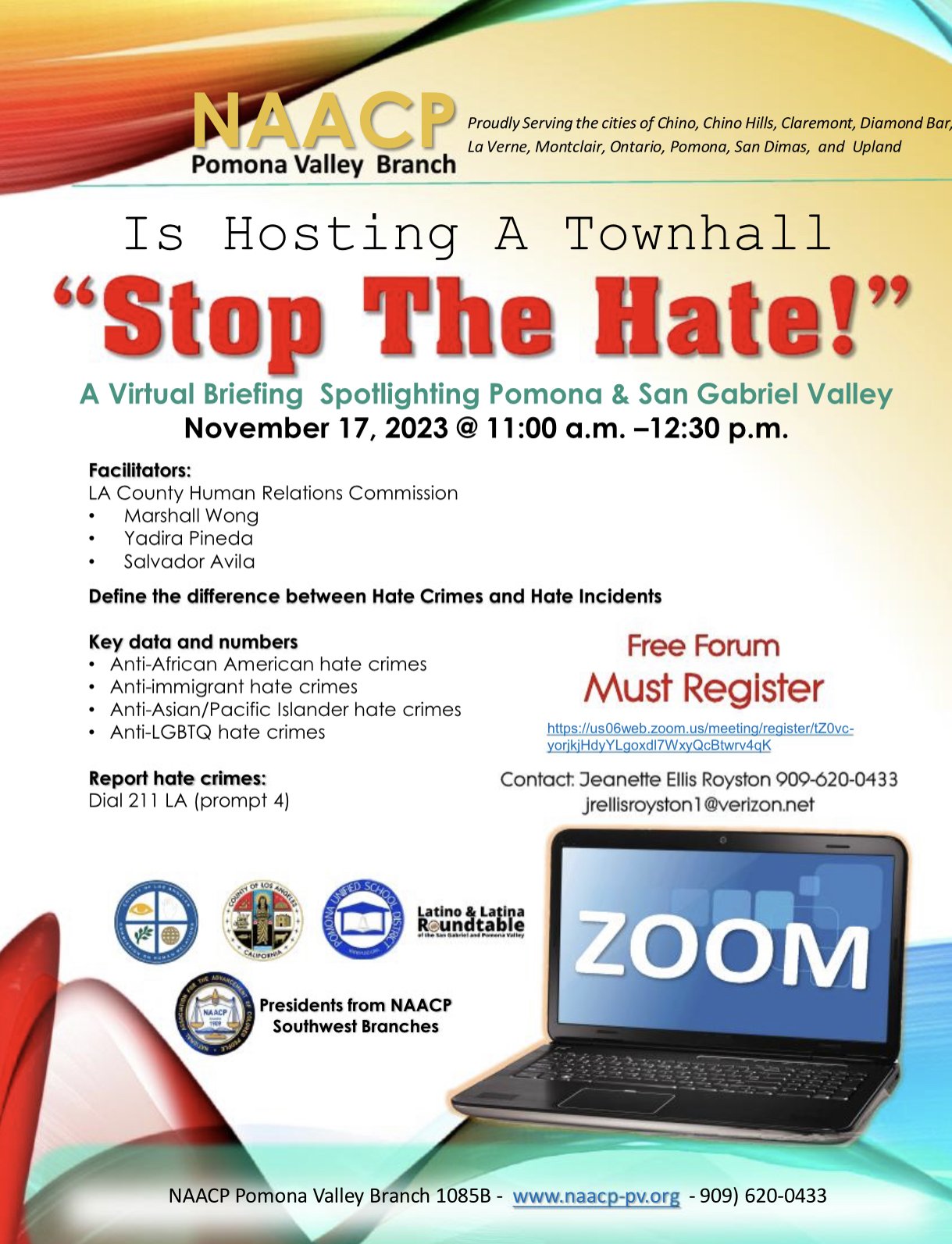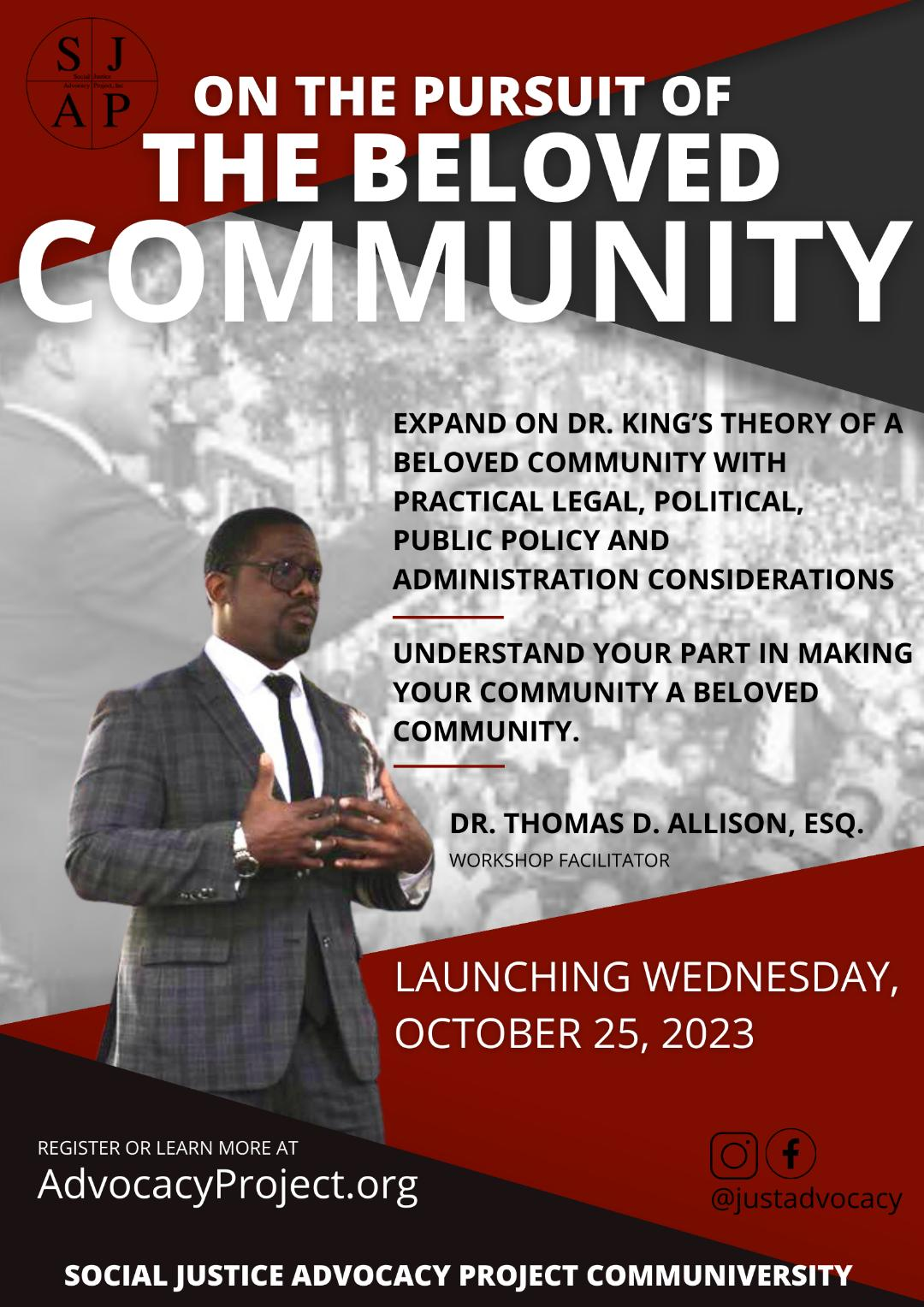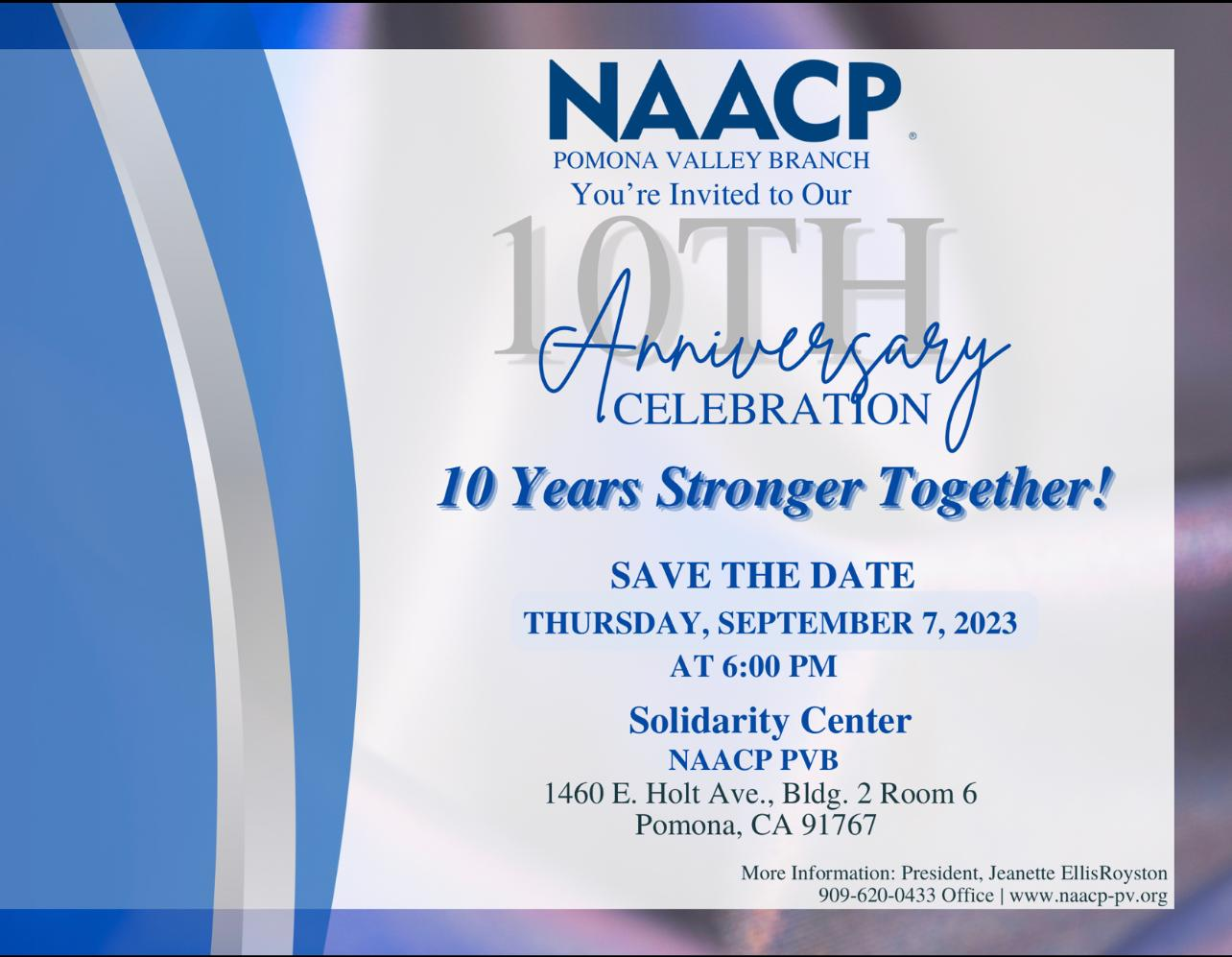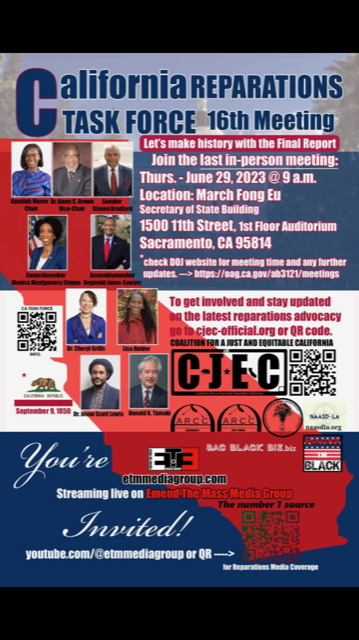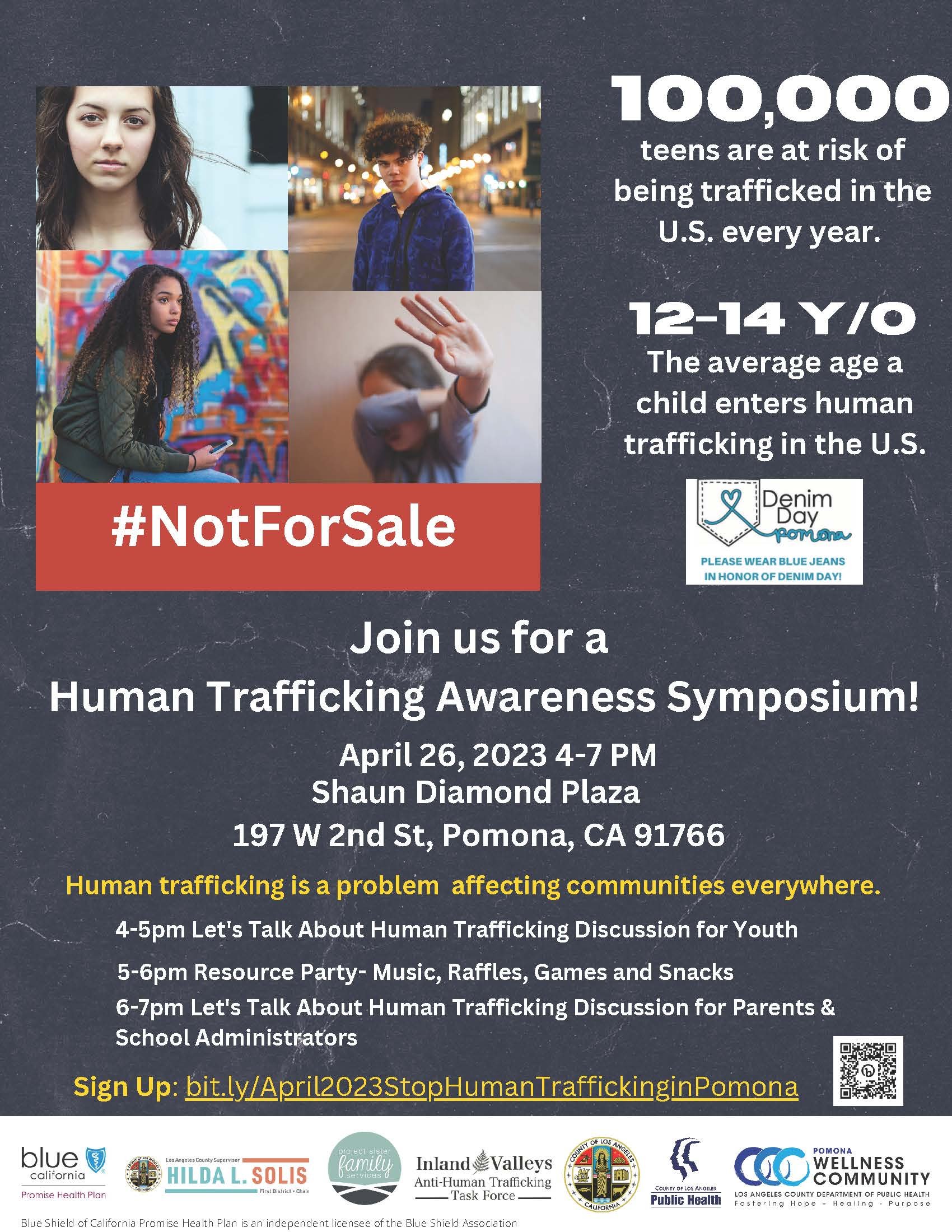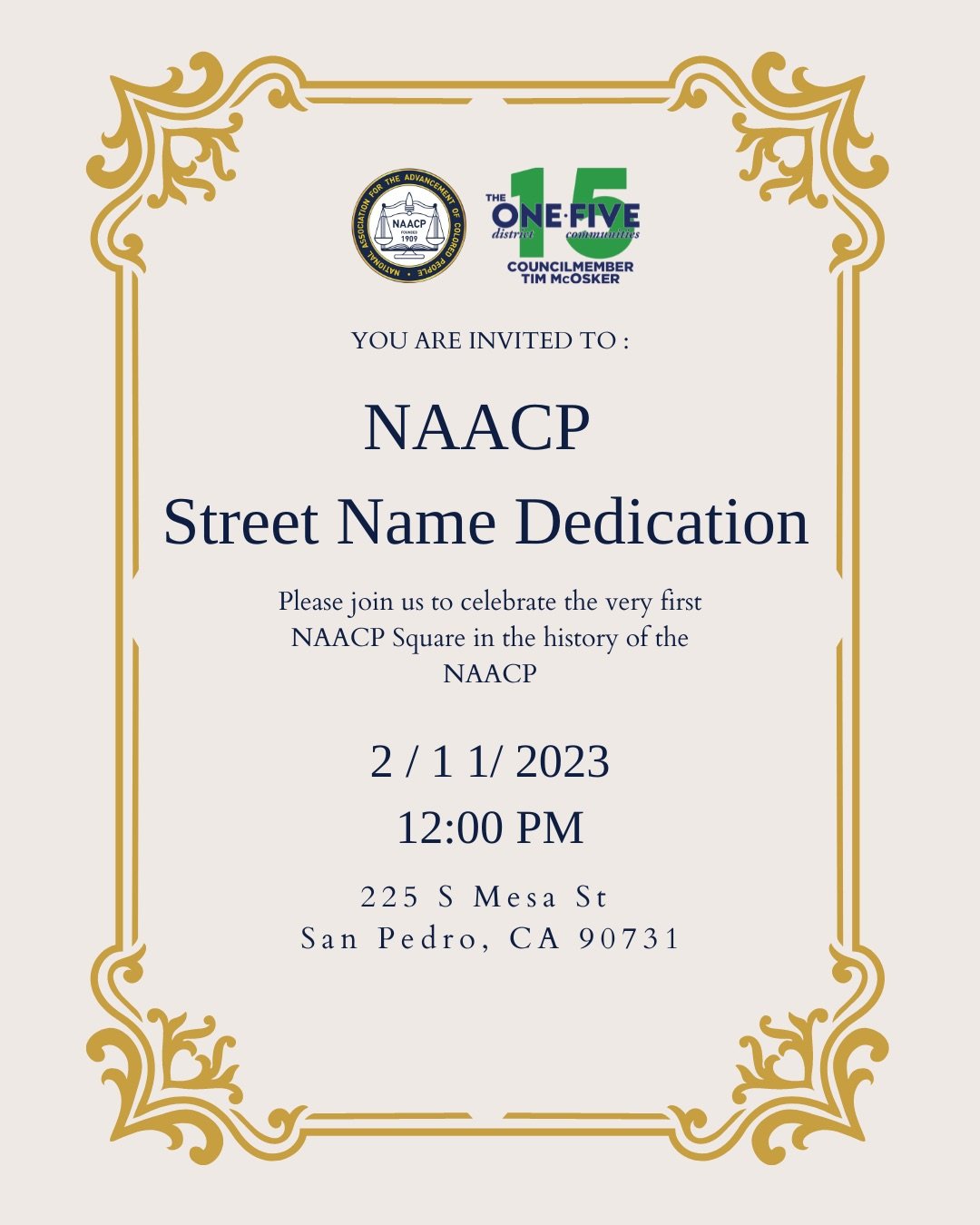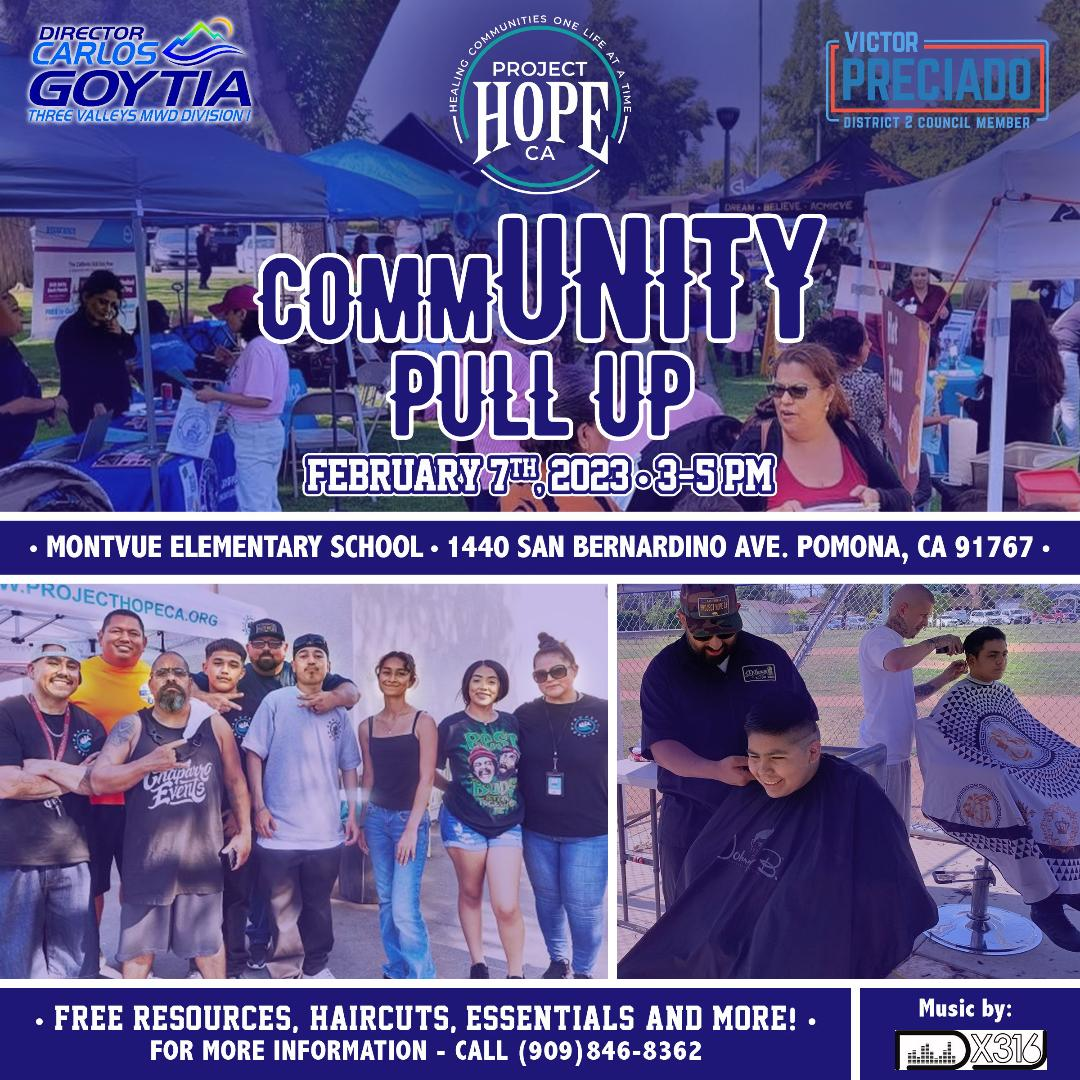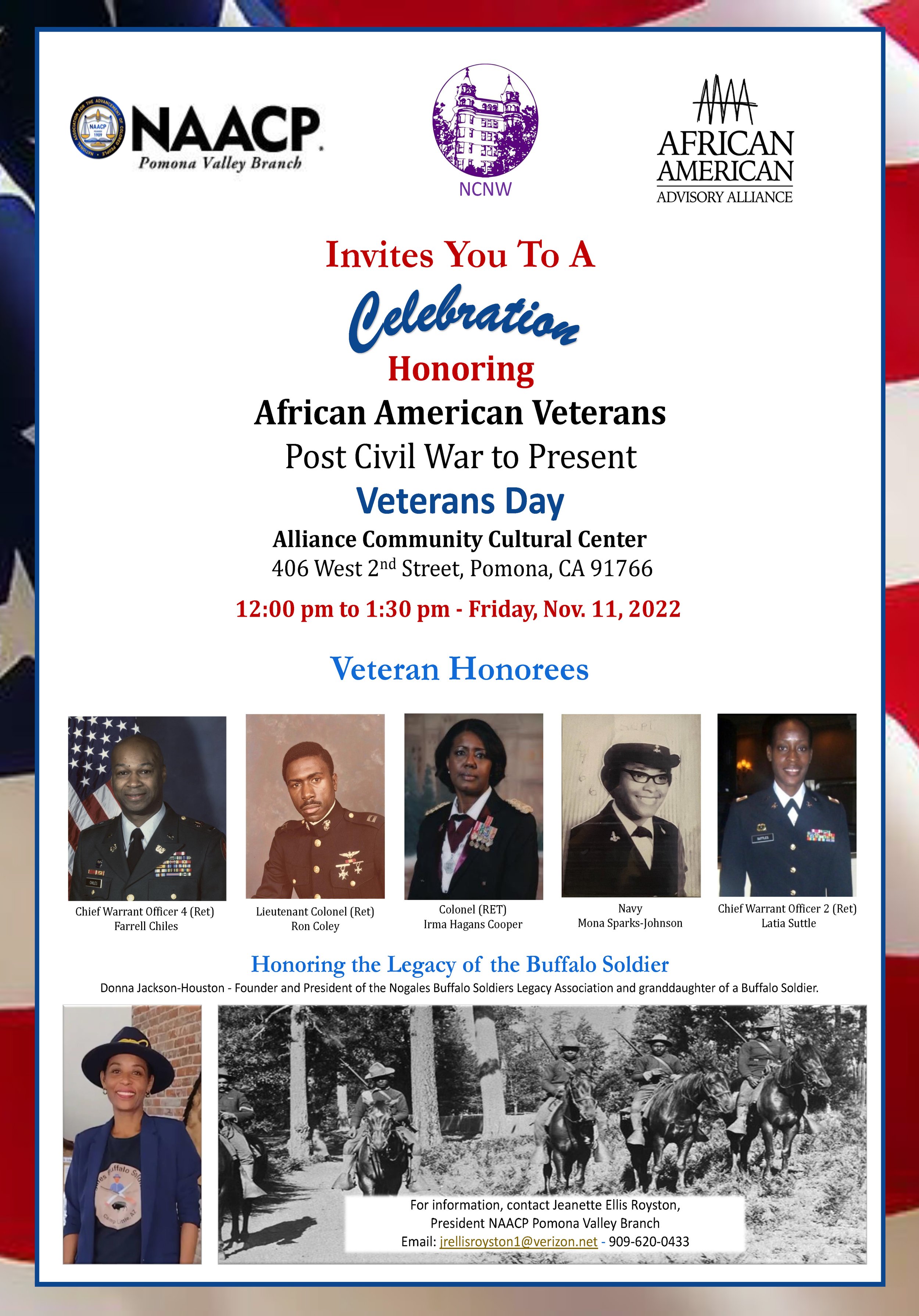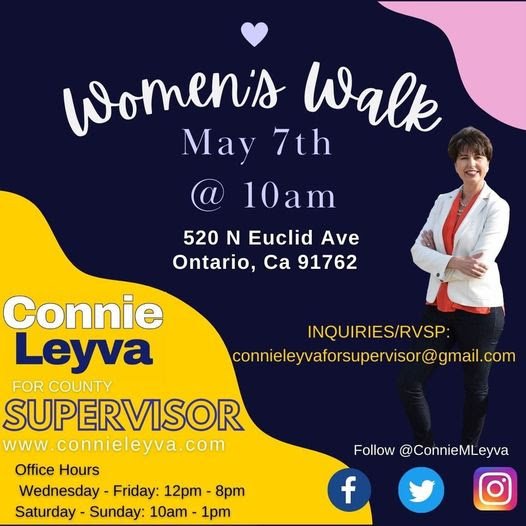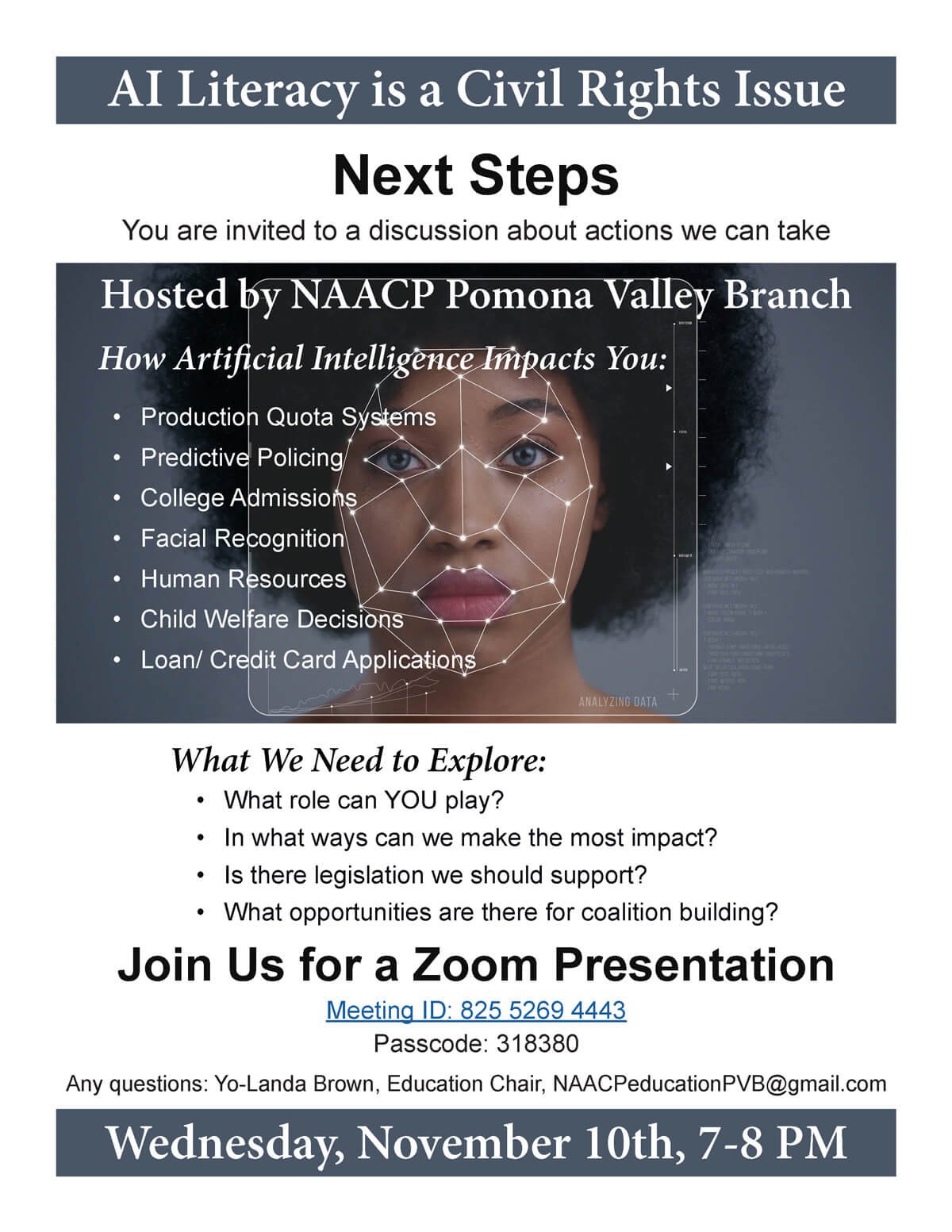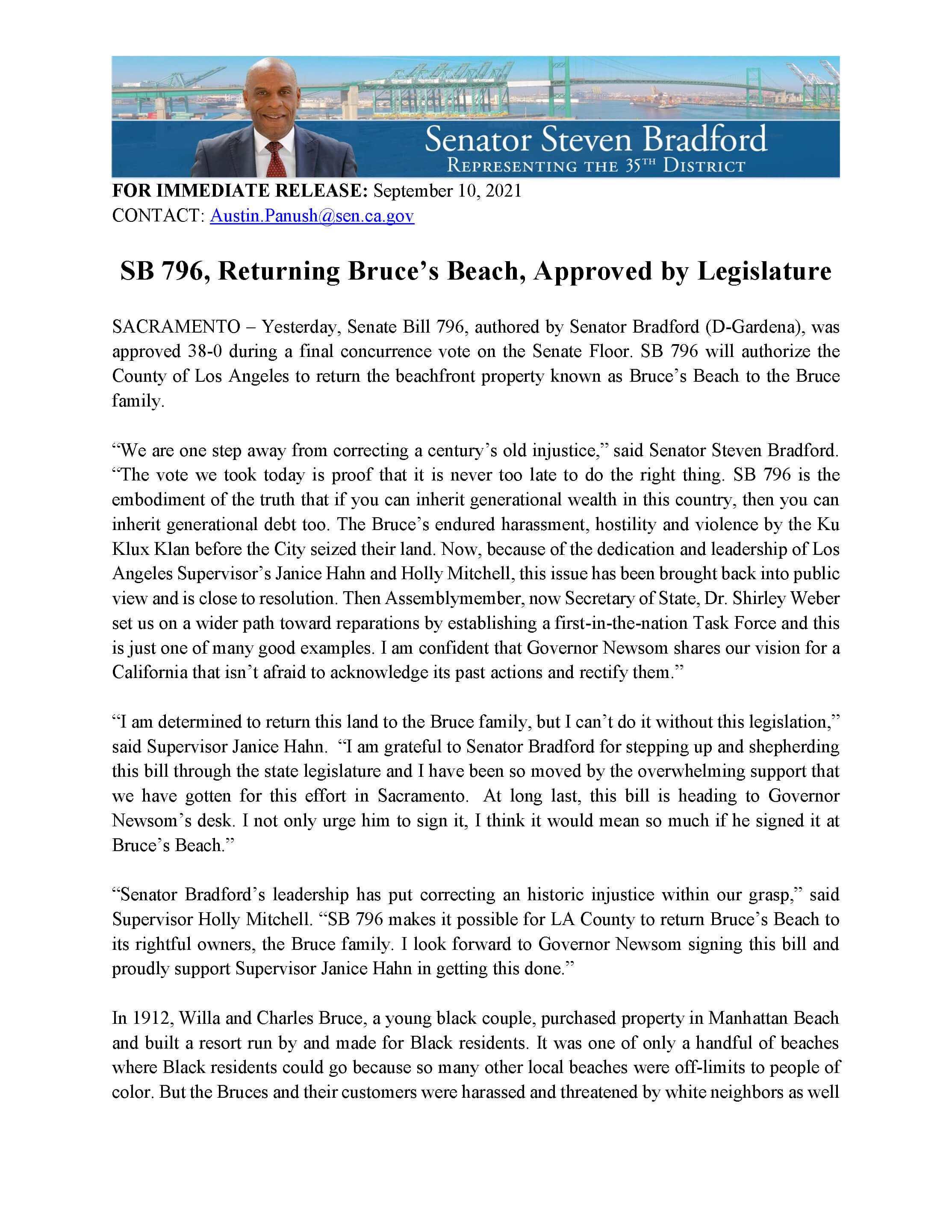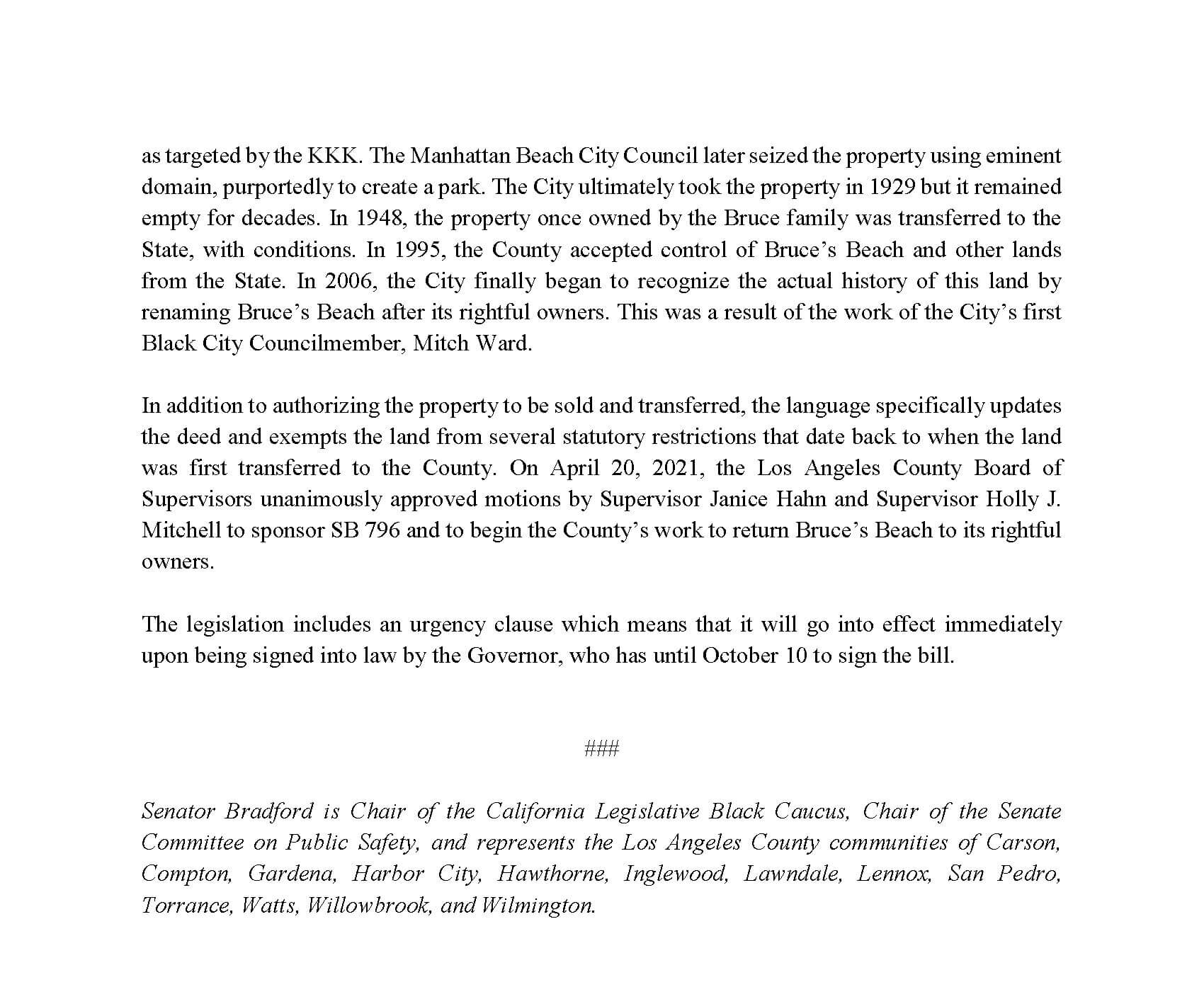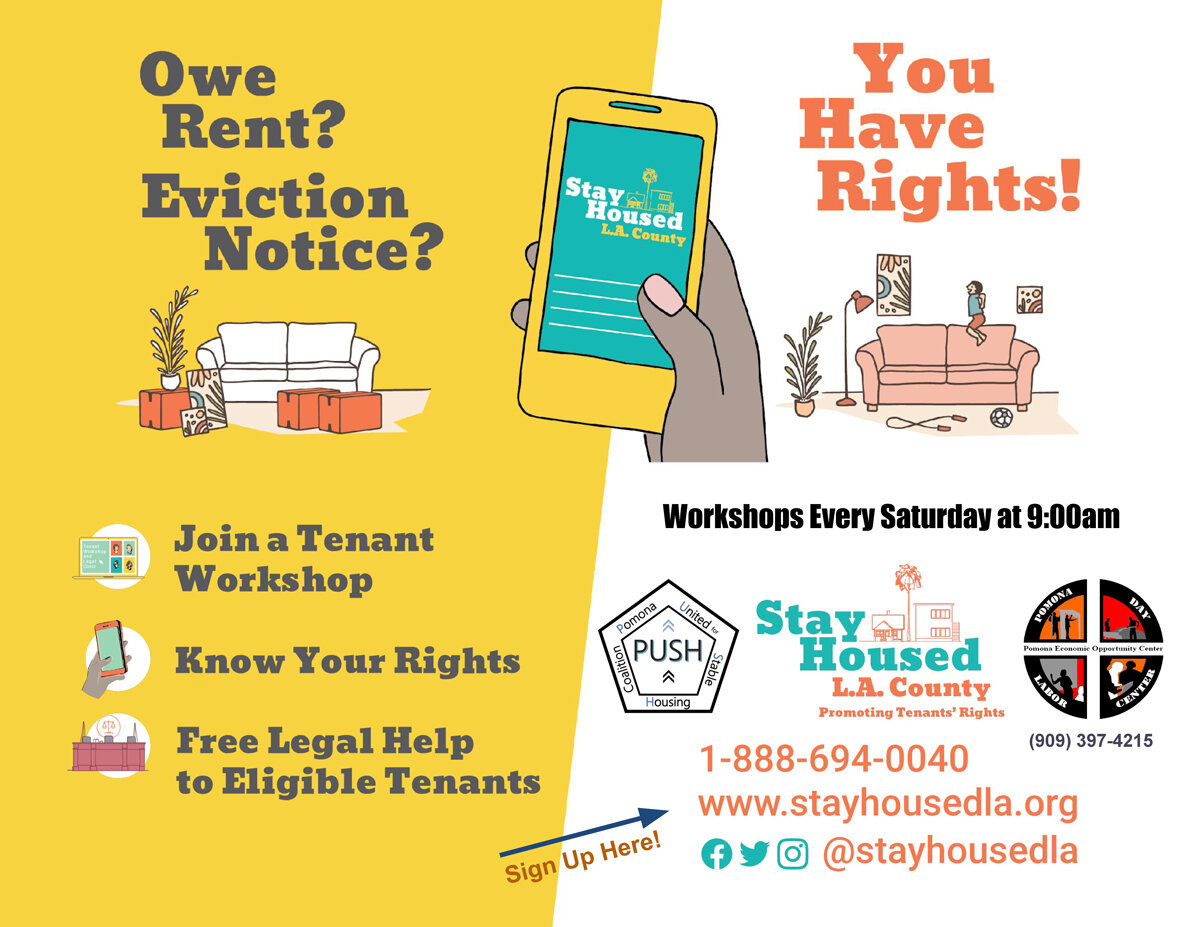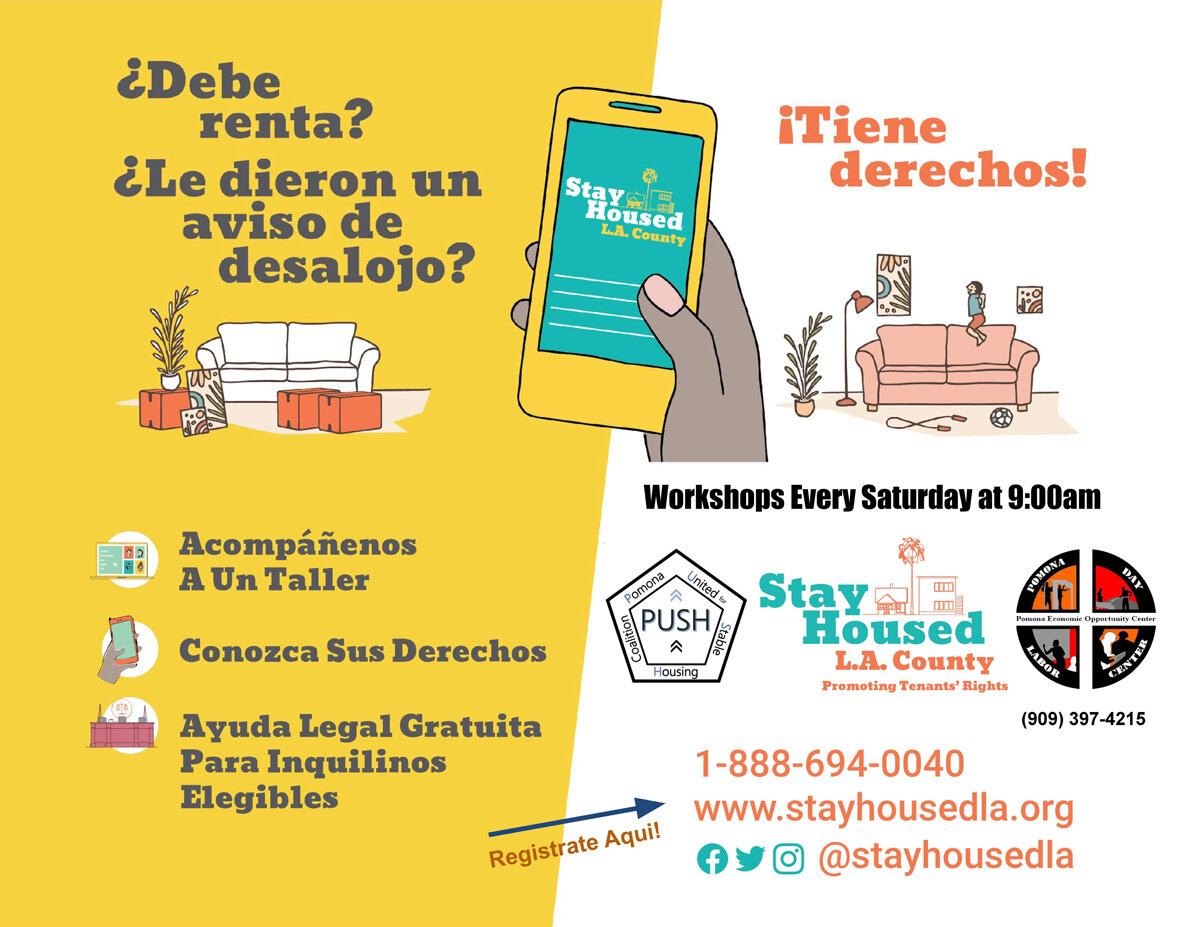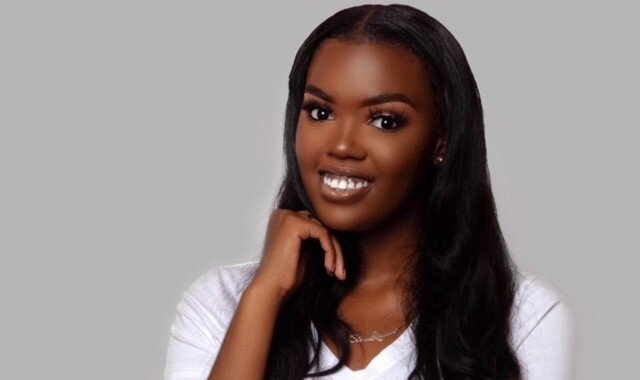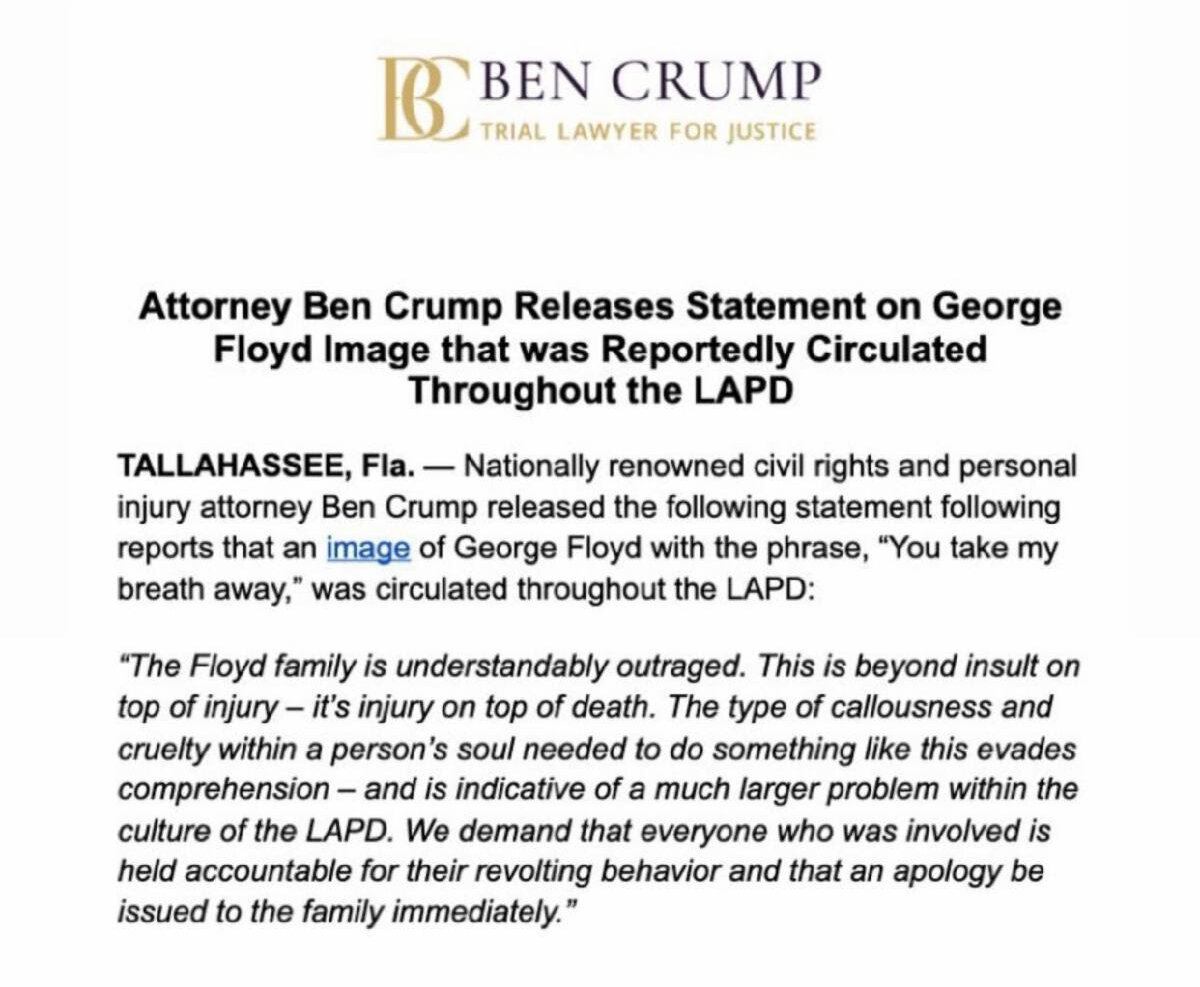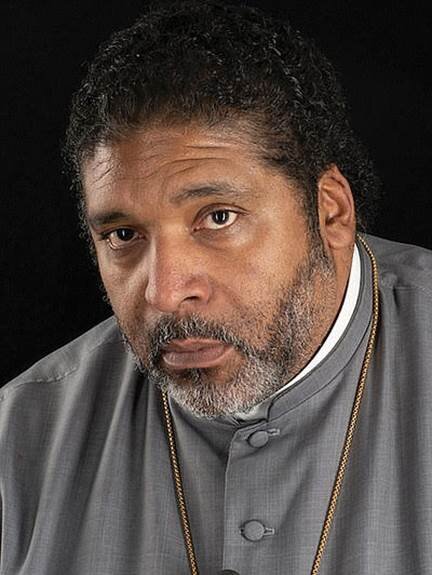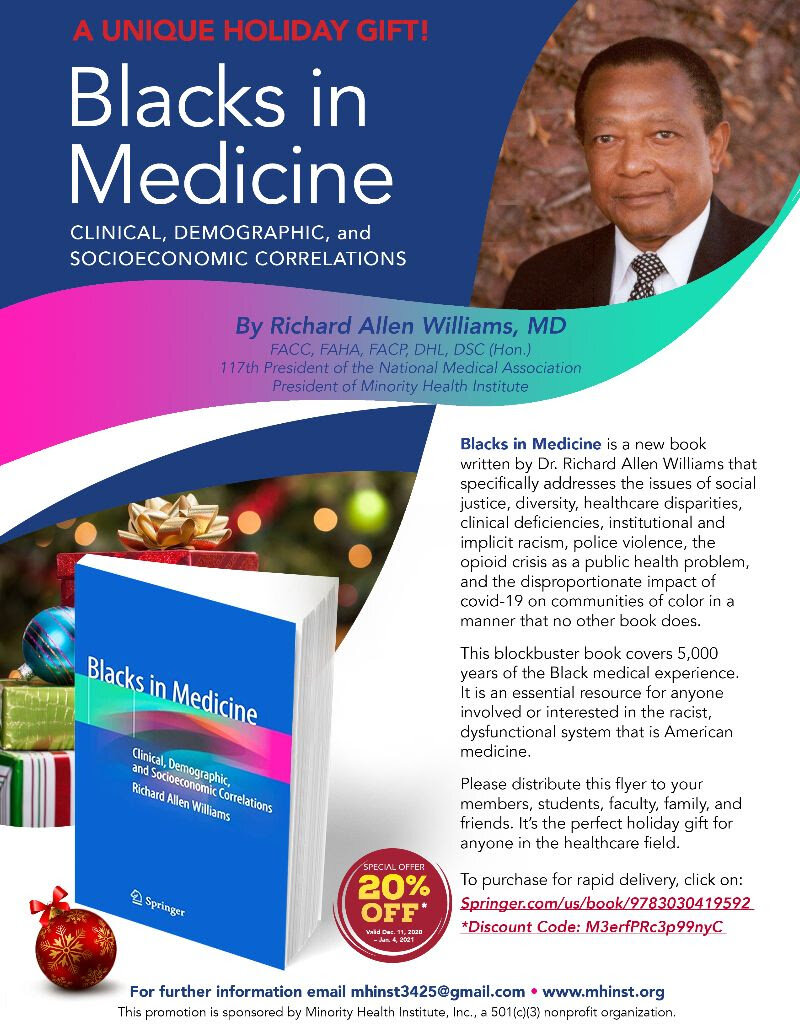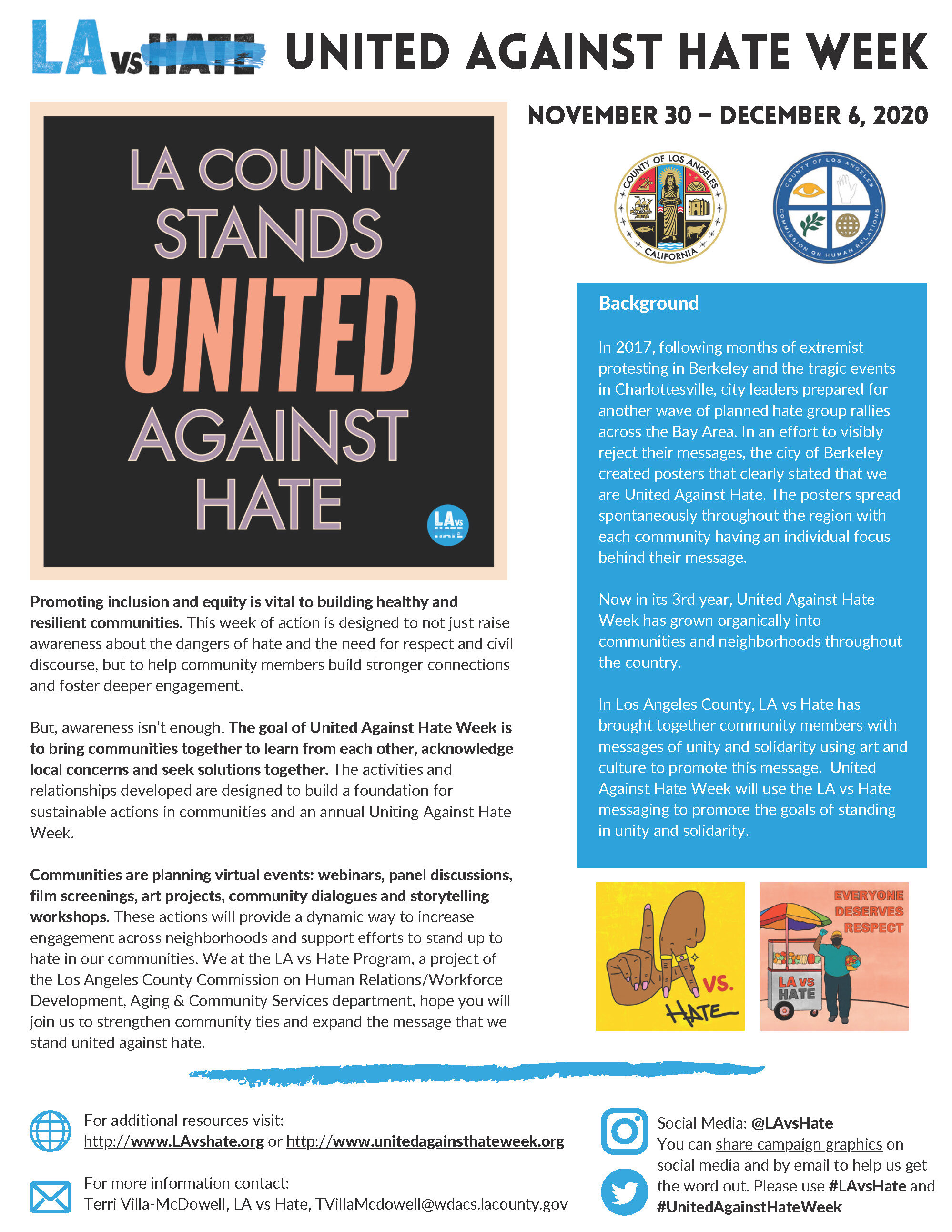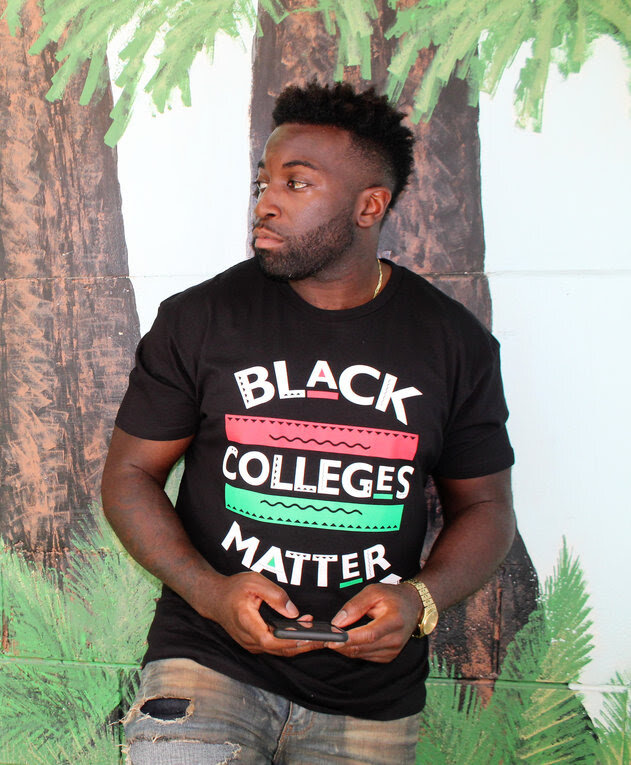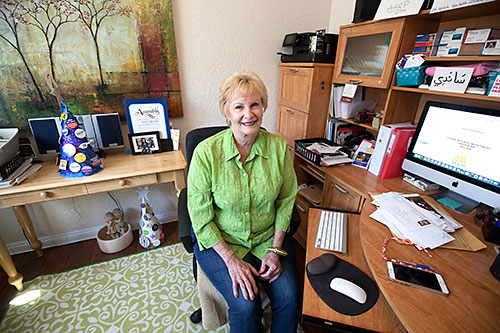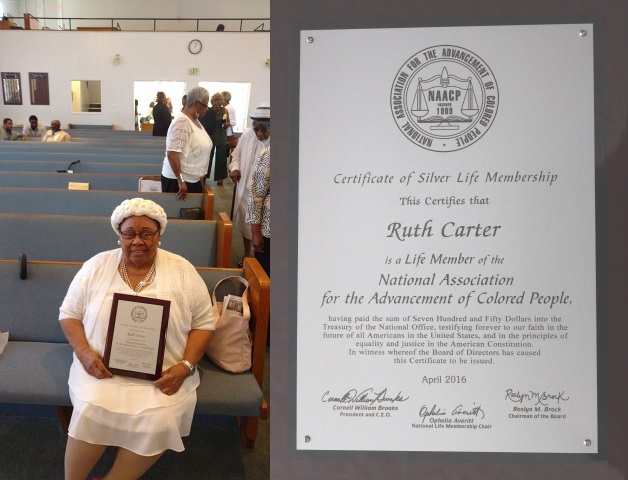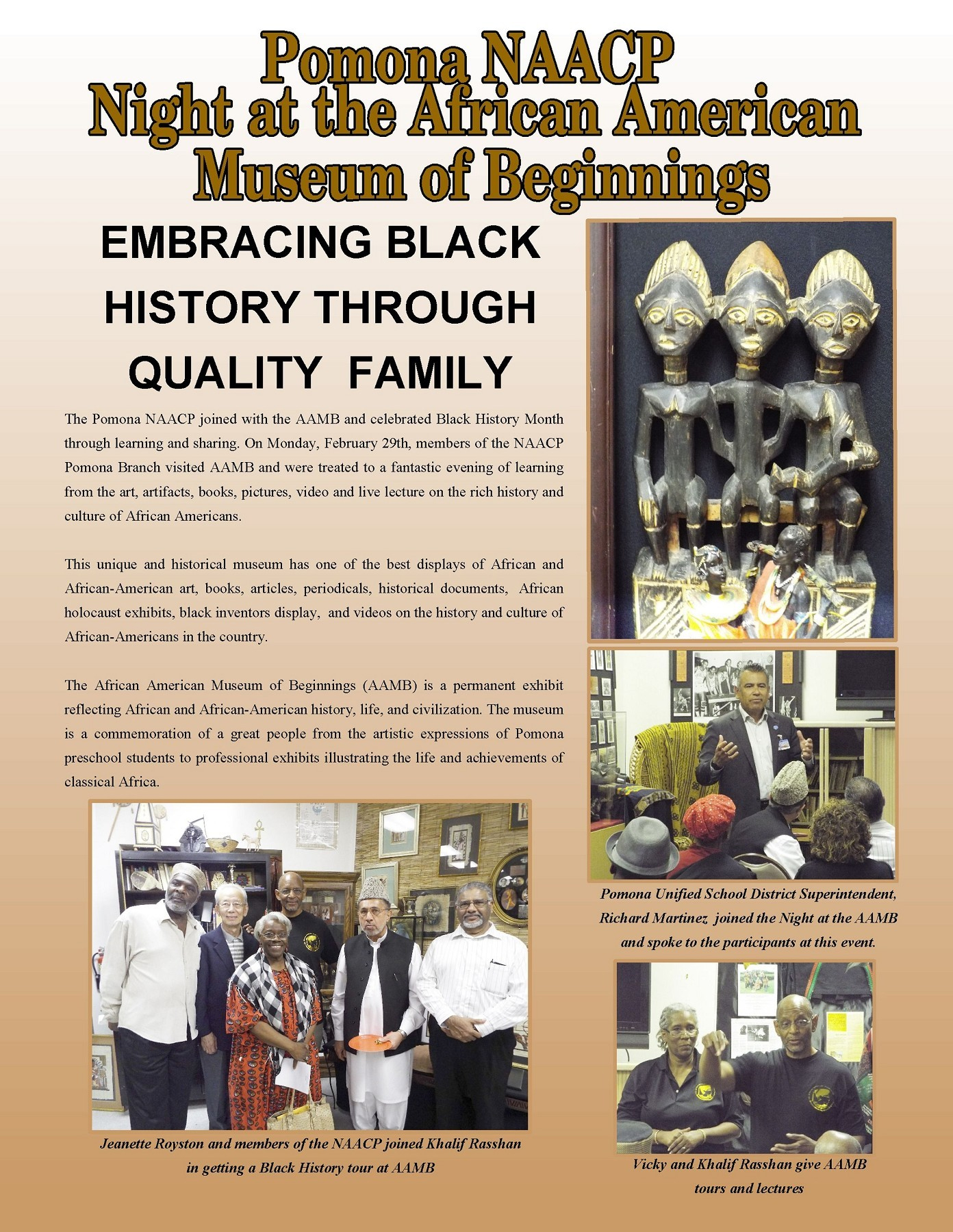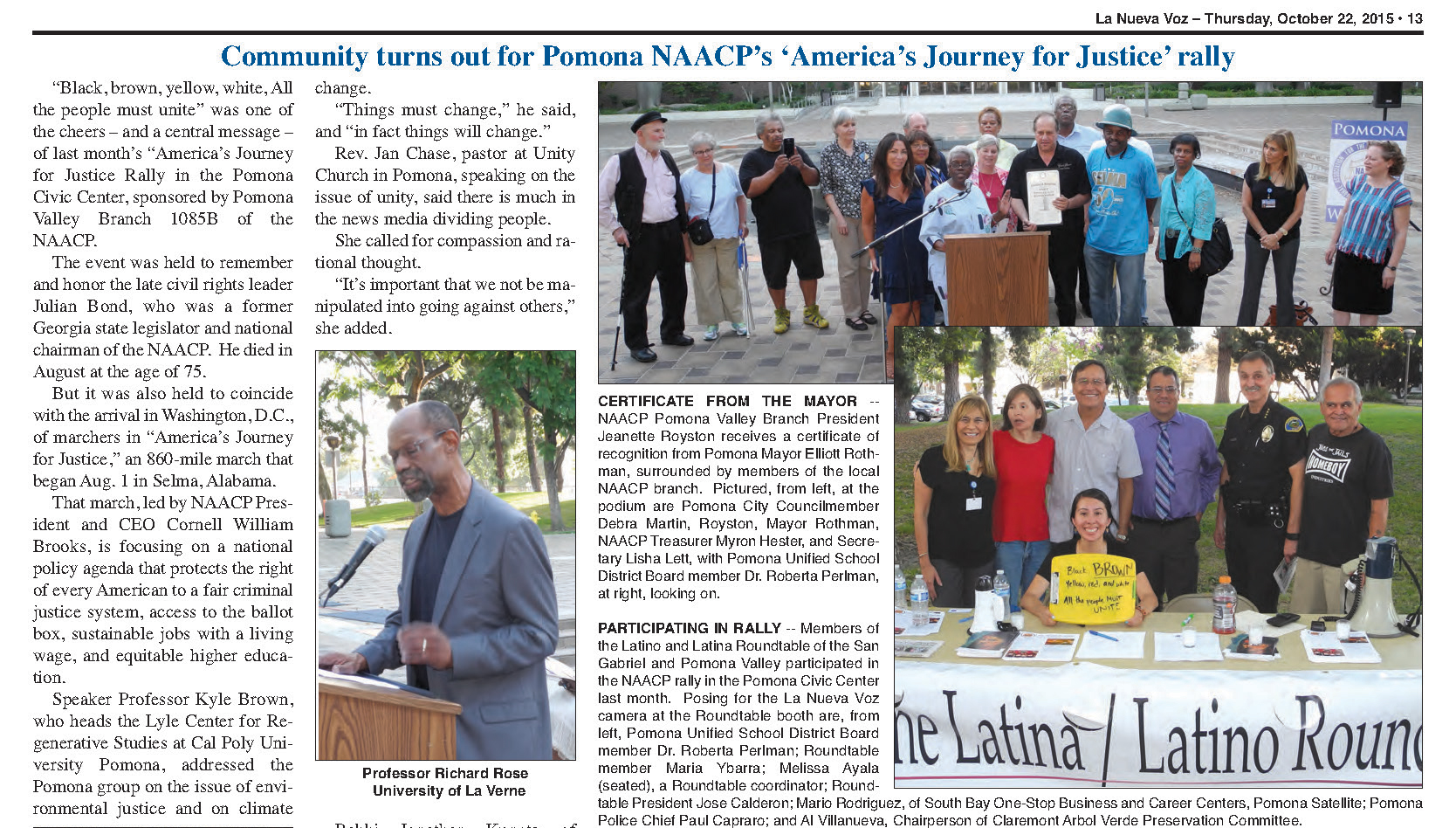IN THE NEWS
Harriet Tubman Celebration!
Join our Alliance & @girltrek community as we celebrate the life and legacy of Ms. Harriet Tubman on Sat, March 9, 2024. Starting at 10am, we will gather at the Alliance Community Cultural Center and begin an inspiring 1.3 mile Harriet Tubman Walk to the Harriet Tubman Statue at Lincoln Park where we will join with @unitydayla organizers for a special program.
Sat, March 9, 2024 - 10am
Harriet Tubman Walk
Alliance Community Cultural Center
406 W. 2nd St - Downtown Pomona
African American Advisory Alliance - Pomona
36 Annual Ahmadiyya Muslim Community convention- Dec. 22, 2023 in Chino NAACP PVB and LRT Members attended
Madeline Rios, Jeanette Ellis Royston, Mahammal, Rose Calderon, Jose Calderon, Maria Rachel Kirk, & Maria Galvan enjoying dinner after an hour presentation pushing LOVE and Peace for ALL and a call for PEACE around the world.
-
The "Hands Off Our Healthcare: Keeping Families Covered" campaign is twofold and advocates that the most vulnerable members of our community receive the necessary health coverage they deserve. The first campaign phase is a Medicaid Unwinding Research Report (attached) that launched on Monday, November 6th. The second phase is our Civil Rights Medicaid Scorecard, scheduled for release next Monday, November 13th.
PHASE 1: Six-Month Look into Medicaid Unwinding Research Report
The first phase of the campaign is a research report developed from a coalition of human and civil rights organizations. President Derrick Johnson participated on the national press conference call, and this is what he highlighted related to the research report: o In December 2022, the NAACP and other leading civil rights organizations, released a report to urge Congress to take immediate action and prevent the public health crisis we are currently facing. They did nothing.
Three-quarters of the people who lost Medicaid may have been eligible. They were terminated for procedural reasons.
This crisis has already impacted more than 10 million people - a majority of whom come from Black and other vulnerable communities.
Politicians must take their hands off our healthcare to make healthcare for all a reality.
We are urging Governors to pause procedural Medicaid terminations and use an automated Medicaid enrollment renewal process moving forward so eligible people get the coverage they deserve.
During the press call, Rep. Jill Tokuda (D-HI) expressed the importance of elected officials addressing this health coverage crisis head-on to ensure that those eligible for Medicaid coverage—especially from Black and brown communities—remain covered.
PHASE 2: Civil Rights Medicaid Scorecard
Next week, we will be releasing the second part which is our Civil Rights Medicaid Scorecard. The scorecard will assess each governor's performance in providing Medicaid coverage to their state's residents. Ultimately, states and their respective governors are evaluated based on their commitment to safeguarding the health of our communities by ensuring continued health coverage for all eligible individuals. Grades are pass, fail, or incomplete.
We look forward to building on the momentum of such an important and necessary campaign and will be updating you regarding the next phase. More to come!
Thriving Together,
Idris Robinson (He/Him/His)
Director, Health and Well-Being Program
irobinson@naacpnet.org
Hosted by the Pomona Valley NAACP and in collaboration with the County of Los Angeles Human Relations Commission, Pomona Unified School District, Latino & Latina Roundtable of San Gabriel Valley, Presidents from the NAACP Southwest Branches
We invite you to join us on Friday, November 17th for a town hall meeting “Stop the Hate!” -A virtual briefing spotlighting Pomona and San Gabriel Valley.
Register today via Zoom at: https://us06web.zoom.us/meeting/register/tZ0vc-yorjkjHdyYLgoxdl7WxyQcBtwrv4qK
We hope you’ll join us for this important community dialogue.
1:00 p.m. PST
YouTube
https://bit.ly/MaryDTalkShow911
Your Like & Subscribe appreciated.
They were accountants, college-educated professionals, high-ranking military officers with Purple Heart medals, husbands, wives, mothers, fathers and even children. Proud citizens living the American Dream, they were also Black when they died 22 years ago on September 11.
-
They were accountants, college-educated professionals, high-ranking military officers with Purple Heart medals, husbands, wives, mothers, fathers and even children. Proud citizens living the American Dream, they were also Black when they died 22 years ago on September 11.
For years they led productive lives and managed successful careers before they perished when a hijacked American Airlines Boeing 757 smashed into the headquarters building of the U.S. Department of Defense, the Pentagon, that day.
Today, 49 of the 125 victims of the terrorist attacks at the Pentagon remain a group of forgotten Americans whose names and faces are rarely shown or mentioned on the anniversary of the most horrific day in American history.
This weekend, the nation will reach another milestone as it marks the 20th Anniversary of the September 11 attacks.
There will be speeches, moments of silence and the reading of the names at the 911 Memorial site in New York where the World Trade Center once stood before terrorists flew two planes into them, killing 2,996 people.
At the Pentagon, 189 people died after one part of the massive building was struck by an airplane. In Shanksville, Pennsylvania, 44 people died when terrorists crashed United Airlines Flight 93 in a vacant field.
Many Americans may not know that hundreds of Blacks were among those who perished that day. About 267 Blacks died that late summer morning in New York City, Washington, D.C., and Shanksville, PA. According to the Centers for Disease Control and Prevention, 215 Blacks died in the attacks on the World Trade Center. About 49 Blacks died at the Pentagon and three died in Shanksville, PA.
September 11 has grown into a hallowed, solemn day that is laced with American patriotism and reverence of the nation’s military. But year after year, on the anniversary of the worst terrorist attack on American soil, news organizations run stories on the lives of the victims, many of whom were white, Jewish, accomplished and affluent citizens who had high-paying jobs on Wall Street and in Washington, D.C., before their lives ended.
The images of white businessmen escaping the Twin Towers of the World Trade Center injured, in suits caked with debris, has somehow given many the impression that the September 11 attacks were tragedies affecting America’s upper crust and privileged elite. In reality, the attacks were a tragedy that affected all races, including Blacks.
In death, as in life, the Black victims were also well-educated Black professionals and military officers. To some, it is another event that makes Blacks feel less American and less patriotic about a country they spent their entire lives helping to build.
In 2011, on the Tenth Anniversary of the attacks, Time Magazine published “Beyond 9/11: Portraits of Resilience,” a photo-rich commemorative edition. Of 64 pages, there were no photos of identifiable Black Americans. Asked about the omission by the online Black publication The Root, a Time Magazine spokesman declined to comment. In 2006, Jason Thomas, a former U.S. Marine who helped to rescue a pair of Port Authority police officers in the rubble, was portrayed by a white actor in the film “World Trade Center.” But that same year, Gary Commock, a Black actor, played the late First Officer Leroy Homer in “United 93,” which chronicles the September 11 crash in Shanksville, PA.
In 2002, the New York Times reported that of the 343 firefighters killed that day, about a dozen were Black and a dozen were Hispanic. The story came amid a controversy over a decision to create a memorial statue that was based on three white men.
After the Twin Towers at the World Trade Center collapsed on September 11, Paula Edgar from Brooklyn lost her mother, Joan Donna Griffith, according to an article in Essence Magazine on the 15th Anniversary in 2016. She was in the South Tower, which was the first to collapse after both were hit.
“The day it happened it was very jarring because I was 3,000 miles away from home; I was living in California,” said Edgar, who had moved to California in 1997. “Being so far away and knowing that everything was happening, and my family was being impacted was really hard to deal with. I felt like I couldn’t reach out and touch them.”
“Phone lines were down and the only real connection that you had was through the television,” Edgar told Essence. “I had gotten this sixty-inch television two days before so, literally, I saw the towers fall really crisp and really clearly first thing in the morning on that Tuesday.”
Edgar said her “mother didn’t have the opportunity to live her life and fulfill the dreams that she had.”
All three September 11 memorial sites have since erected living memorials dedicated to all the victims. Their names are etched in granite and marble slabs that attract visitors year-round. None have the pictures of the victims, which could help educate future generations about the full story of the victims of September 11.
One online publication where visitors can learn the identity of the September 11 victims and their individual stories is The Pentagon Memorial Fund website. The platform has pictures and stories of every victim who died during the attack on the Pentagon.
The Crusader visibly identified 49 Black victims. At least 14 worked in the Pentagon, 17 served in the U.S. Army and eight served in the U.S. Navy. At least eight were budget analysts at the Pentagon and four were accountants there. Three were teachers in the Washington, D.C., area and three were elementary school children who were just 11 years old when the building was hit.
The website also lists all the victims in the World Trade Center attacks, but it understandably doesn’t include all the photos of the thousands of victims. But one can get a full scope of the lives of Blacks who were at the Pentagon or on American Airlines Flight 77 during the attack.
The flight was scheduled to travel from Dulles International Airport near Washington, D.C., to Los Angeles International Airport on September 11, 2001.
Five hijackers boarded the flight. One of the hijackers, Hani Hanjour, was a trained pilot. About half an hour after takeoff, the hijackers took control of the aircraft. At 8:54 the westbound plane turned to the south, a deviation from its flight plan. Two minutes later, the airplane’s transponder was turned off. Radar contact was also lost.
The hijacked plane traveled undetected back toward Washington for 36 minutes. At 9:32 a.m., air traffic controllers at Dulles found an unidentified aircraft traveling east at a high rate of speed and notified officials at Reagan National Airport. At 9:37 a.m. Flight 77 slammed into the Pentagon.
The plane hit the outer wall between the first and second floors of the building. The jet fuel exploded into a fireball. A half an hour later, a section of the building above where the plane hit collapsed. By that time, most people working at the Pentagon had been evacuated. However, 125 people working in the building were killed, as were the 64 crew, passengers, and hijackers on the plane.
The Black victims of the 911 terrorist attacks are for the most part remembered as nameless and faceless statistics. But they, too, have stories, of family, career, school, of lives ripe with future plans.
One Black victim, Amelia V. Fields, was celebrating her 46th birthday that day. Her husband and high school sweetheart, William Fields, a retired Marine Corps master sergeant, slipped out of their home during breakfast to place a surprise birthday card in her car. While she headed to work at the Pentagon, where she was a civilian secretary for the Army, he baked a chocolate cake for when she would have arrived home that night.
Fields has not been heard from since the attack. Her husband remains uncertain how to register certain aspects of her fate. She had worked there for only two days, having been assigned previously to Fort Belvoir in Fairfax County, Virginia.
Another victim, Sara M. Clark, 65, and her fiancé had decided to have their wedding reception at a yacht club in Baltimore. The Sunday before Tuesday, September 11, they went shopping for wedding bands. On Tuesday morning, they kissed, embraced and said, “I love you,” to each other before she left their Columbia home for Dulles International Airport.
Dr. Yeneneh Betru, born in Addis Ababa, Ethiopia, immigrated to the United States in 1982 with the dream of becoming a physician. He attended high school at the Abbey School in Colorado, College at Loyola Marymount in Los Angeles, Medical School at the University of Michigan, and later completed his residency at Los Angeles County–USC Medical Center. During the last three years, he worked as the Director of Medical Affairs for IPC–The Hospitalist Company in Burbank, California. He was only 35 years old.
Major Clifford Patterson is one of four high-ranking Black military officers who earned the prestigious Purple Heart medal before he perished in the Pentagon attack. Patterson, who served in the U.S. Army, left behind a wife and two young sons. He is buried at Arlington National Cemetery.
Eddie Dillard, 53, from Gary, Indi- ana, was on his way to California, where he planned to paint a house he owned in Los Angeles and visit his only child, who lives in the East Bay area. He was a retired marketing executive with Philip Morris Tobacco Company.
Asia Cottom, 11, had just started sixth grade at a new school, eager to learn and pleased to be at the campus where her father worked. She and her teacher Sara Clark were selected to take a four-day trip to California to participate in a National Geographic Society ecology conference. They never made it.
Another 11-year-old victim, Rodney Dickens, grew up in several tough Washington neighborhoods, but he had always made the honor roll. His life was cut short when he and his teacher at Ketcham Elementary School boarded American Airlines Flight 77.
Thanks to the generosity of funding provided by The Field Foundation of Illinois, Inc. in producing this article.
(Published in the Chicago Crusader Newspaper September 11, 2021)
-
The 9/11 attacks on the U.S on September 11, 2001 were arguably the most tragic events in the history of the country. Airliners crashed into the World Trade Center in New York City, the Pentagon in Washington, D.C. and into a field in Shanksville, Pennsylvania. More than 2,753 people were killed in the New York attacks, 256 on the four planes, and 125 at the Pentagon. While all Americans suffered an indescribable feeling of horror and loss on that fateful day, African Americans were no less impacted by this American tragedy.
Accurately documenting and highlighting the impact of 9/11 on African Americans has been a challenging task. Complicated by the politics of race and the tendency to either ignore or obscure the African American presence in events of national importance the nation has been slow in recognizing African American victims of 9/11. Some have referred to this lack of acknowledgement as the “white washing of 9/11.” The presentation of 9/11 as largely premised around white heroics minimized the role of African Americans.
Almost from the outset, memorialization of 9/11 reflected “white washing.” This is evident in the initial statute honoring members of the Fire Department of New York (FDNY) killed in the attack. It featured three white firefighters. In 2002, the New York Times reported that 12 Black firefighters were among the 343 firefighters killed in the attack. In 2011, the tenth anniversary of the attack, Time Magazine published a ten-year commemorative issue, Beyond 9/11 which included no photos of identifiable African Americans.
To address these omissions, relatives of survivors have been at the forefront of efforts to preserve the memory of Black victims of the 9/11 tragedy. In the case of the 12 African American firefighters killed on 9/11, Irene Smith, mother of Leon Smith, a firefighter at Ladder 118 in Brooklyn, New York, has been active in preserving their memory. Likewise, Ethel Henry, now 96 years old, does not miss an opportunity to honor the memory of her son William Henry. Henry was a 20 year veteran of the fire department and was based in Rescue 1 in Manhattan. The names of the 12 Black firefighters killed in the attacks include, Gerard Baptiste, Vernon Cherry, Tarel Coleman, Andre Fletcher, Keith Glascoe, Ronnie Henderson, William Henry, Karl Joseph, Keith Roy Maynard, Shawn Powell, Vernon Richard, and Leon Smith.
Black victims of all ages died on the planes that hit the Twin Towers. Paula Edgar lost her mother Joan Donna Griffith on that fateful day. Joan Donna Griffith was an Assistant Vice President and Office Manager at Fiduciary Trust. She worked on the 97th floor of the South Tower of the World Trade Center. Griffith was a survivor of the 1993 World Trade Bombing. She perished when the South Towers collapsed. Two children, Asia Cottom and Rodney Dickens, also perished on the planes that hit the Twin Towers. Cottom had just started sixth grade at a new school. She was selected to take a four-day trip to California to take part in a National Geographic Society ecology conference. Rodney Dickens, an honor roll student, who grew up in tough neighborhoods, died aboard American Airlines Flight 77.
At the Pentagon,49 of the 125 victims were Black. Manor Clifford Patterson, recipient of the Purple Heart, perished in the attack. He left behind a wife and two young sons.
Amelia Fields was a civilian secretary for the army. She worked at the Pentagon for only two days before her death.
Twenty years after 9/11, the stories of the victims must be told. This narration is especially true for the Black victims. Their stories should not be whitewashed and their lives matter. They were living, breathing human beings whose lives were cut short in a senseless tragedy. If we have learned nothing from the current twin pandemics of COVID-19 and police brutality against Black citizens, we should value human life and ensure that everyone’s story, regardless of race, class, gender and sexuality is told and acknowledged.
-
On the anniversary of the Sept. 11 attacks, it’s important to take a moment to reflect on the lives lost on one of the most tragic days in U.S. history.
In the New York City Fire Department, which is overwhelmingly white, 12 Black firefighters lost their lives while responding to World Trade Center attacks, and now their mothers are fighting to keep their sons’ memories alive.
From the Huffington Post:
It was Leon Smith's dream to become a firefighter, Smith said. Growing up in Brooklyn, N.Y., the family lived right across the street from a firehouse. She said she always knew just where to find her boy. "He knew his calling even then," she said.
Leon was the driver for Ladder Company 118 in Brooklyn, on September 11, 2001, and one of 343 New York City firefighters to die while responding to the World Trade Center attacks.
“In Leon's company there were eight firefighters that got killed," Smith said. "They found the remains of six of them. They have never found my son. I have a tombstone on an empty grave. One of these days I'll have them, and I'll bury him. I'll never give up."
When the towers crumbled, Smith became part of a tragic sorority of mothers whose boys grew up to be firefighters who died as heroes. But she is also part of another circle of women, a much smaller group whose story of loss on 9/11 mirrors that of the entire FDNY family, but one often forgotten or buried in the heaps of pain.
(Photo by Tayfun Coskun/Anadolu Agency via Getty Images)
-
Two victims of the Sept. 11, 2001 terrorist attacks on New York City’s World Trade Center have been identified.
According to local station News 12, Dorothy Morgan of Hempstead, N.Y., and a man not currently being named were identified via DNA recovered between 2001 and 2006.
Morgan, a 47-year-old grandmother, becomes the 1,646th victim of 9/11 to be identified. More than 2,900 were killed in the attack and many of their bodies were never recovered. Morgan’s identification comes just days short of the 20th anniversary of the attacks.
-
The March on Washington 1968: Reflecting on Change and Unfinished Business
On this significant anniversary of the March on Washington in 1968, we stand at a crossroads of history, reflecting on the progress made and the challenges that persist in the United States. The March on Washington, a watershed moment in the civil rights movement, marked a turning point in American history, demanding racial equality and justice. As we examine what has changed and what remains unchanged, we must also critically assess the changes needed currently and in the future for a more just and inclusive society.
The March on Washington: A Pivotal Moment
The March on Washington for Jobs and Freedom, held on August 28, 1963, was a historic event that brought together over 250,000 people to the National Mall in Washington, D.C. It was a manifestation of the collective yearning for civil rights, economic justice, and an end to racial segregation. The march culminated in Dr. Martin Luther King Jr.'s iconic "I Have a Dream" speech, a passionate call for an America where individuals would be judged by their character rather than the color of their skin.
The march exerted significant pressure on the U.S. government and played a pivotal role in shaping the Civil Rights Act of 1964 and the Voting Rights Act of 1965. These legislations marked essential milestones in the fight against racial discrimination, opening doors to previously excluded opportunities for African Americans and other marginalized groups.
Progress Made: A Glimpse into Change
Since the March on Washington, the United States has undergone substantial transformations. Legal barriers to equality have been dismantled, leading to greater access to education, employment, and political participation for African Americans. Moreover, the nation's consciousness has been raised, and society has made strides in acknowledging the wrongs of its past.
Notably, the election of Barack Obama as the 44th President of the United States in 2008 marked a monumental moment in American history. It signified a shift toward greater inclusivity, showing that barriers based on race could be overcome at the highest levels of leadership. This achievement offered hope that progress was being made, and that the nation was moving closer to realizing the dream of a just society.
Persistent Challenges: The Unchanged Landscape
However, despite these advances, it would be naïve to think that the march's goals have been fully realized. Many challenges from 1968 still linger in contemporary America. Racial disparities in areas such as education, income, healthcare, and criminal justice persist, illustrating that systemic inequalities endure. While overt racism may have become less socially acceptable, subtle forms of bias and discrimination continue to shape the experiences of marginalized communities.
The rise of social movements like Black Lives Matter in recent years has brought renewed attention to these issues. Incidents of police violence against Black individuals, often leading to tragic deaths, have sparked nationwide protests, demonstrating that the fight for racial justice is far from over. These events have underscored the urgent need to address the structural inequalities that underpin these injustices.
Current Changes Needed: A Call to Action
As we commemorate the March on Washington, it is clear that the work of eradicating racism and achieving equality is far from complete. Meaningful change requires concerted effort from individuals, communities, and institutions. There are several areas where immediate action is necessary:
1. Criminal Justice Reform: The criminal justice system remains a focal point of inequality. Comprehensive reform is required to address racial profiling, excessive use of force, and discriminatory sentencing. This includes reevaluating policing methods, advocating for police accountability, and investing in community-based solutions.
2. Education Equity: Educational disparities continue to perpetuate inequality. Addressing the school-to-prison pipeline, ensuring equitable funding for schools, and providing resources for underprivileged students are crucial steps in creating an inclusive education system.
3. Economic Empowerment: Economic disparities persist along racial lines. Policies that promote fair wages, affordable housing, and access to capital for minority-owned businesses can help bridge the wealth gap.
4. Voting Rights Protection: Recent efforts to restrict voting access disproportionately affect minority communities. Protecting and expanding voting rights is essential to ensure that all citizens have an equal voice in the democratic process.
Future Changes: Aspiring Towards Equality
Looking ahead, envisioning the changes needed for a better future demands a broader perspective. Achieving true equality requires a shift in societal attitudes, institutional practices, and policy frameworks. Some areas to consider for long-term change include:
1. Comprehensive Systemic Change: Addressing systemic racism requires dismantling discriminatory structures embedded within institutions. This involves reevaluating policies, procedures, and practices that perpetuate inequality.
2. Intersectionality: Recognizing the interconnectedness of various forms of discrimination is crucial. Gender, sexual orientation, and other aspects of identity intersect with race to create unique experiences of oppression that must be addressed comprehensively.
3. Education and Empathy: Promoting education about the history of racial injustice and fostering empathy is essential for changing attitudes. This can facilitate difficult conversations and encourage individuals to actively challenge their biases.
4. Economic Redistribution: Addressing economic disparities requires not only equal opportunity but also equitable distribution of resources. Policies that focus on wealth redistribution can create a more just society.
5. Political Engagement: Increased representation of marginalized communities in political leadership is vital. This ensures that policies are crafted with the needs and perspectives of all citizens in mind.
Conclusion
As we commemorate the March on Washington in 1968, we stand at a pivotal juncture in history. Progress has been made, yet challenges remain. The legacy of the march calls on us to take stock of the strides achieved and the work yet to be done. To achieve a more just and equitable society, we must collectively commit to addressing the deeply ingrained inequalities that persist, fostering empathy and understanding, and advocating for comprehensive changes that touch every facet of American life. The future holds the promise of a more inclusive nation, but it is up to us to translate that promise into reality.
You may believe that your participation and donations do not matter...but you are wrong!
Change is never easy or fast. Change is a slow process that happens when people decide that the status quo is not acceptable. If your desire is to be part of the solution and not the problem, you can become a change agent for our society.
"Remember, most organizations start small, but
their impact to our society is always greater then they will ever know."
CERTIFICATES OF RECOGNITION FOR THE 10 YEAR CELEBRATION
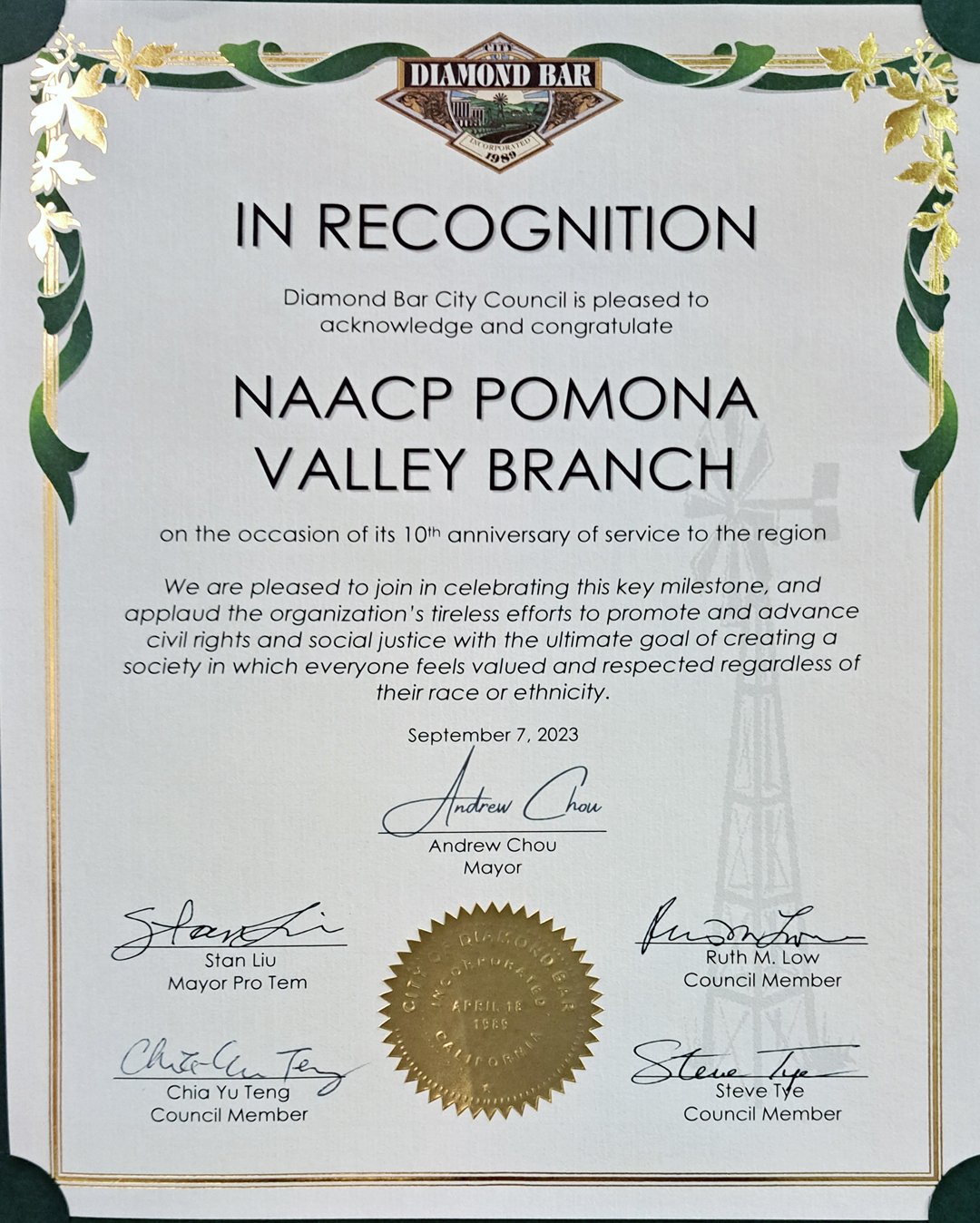
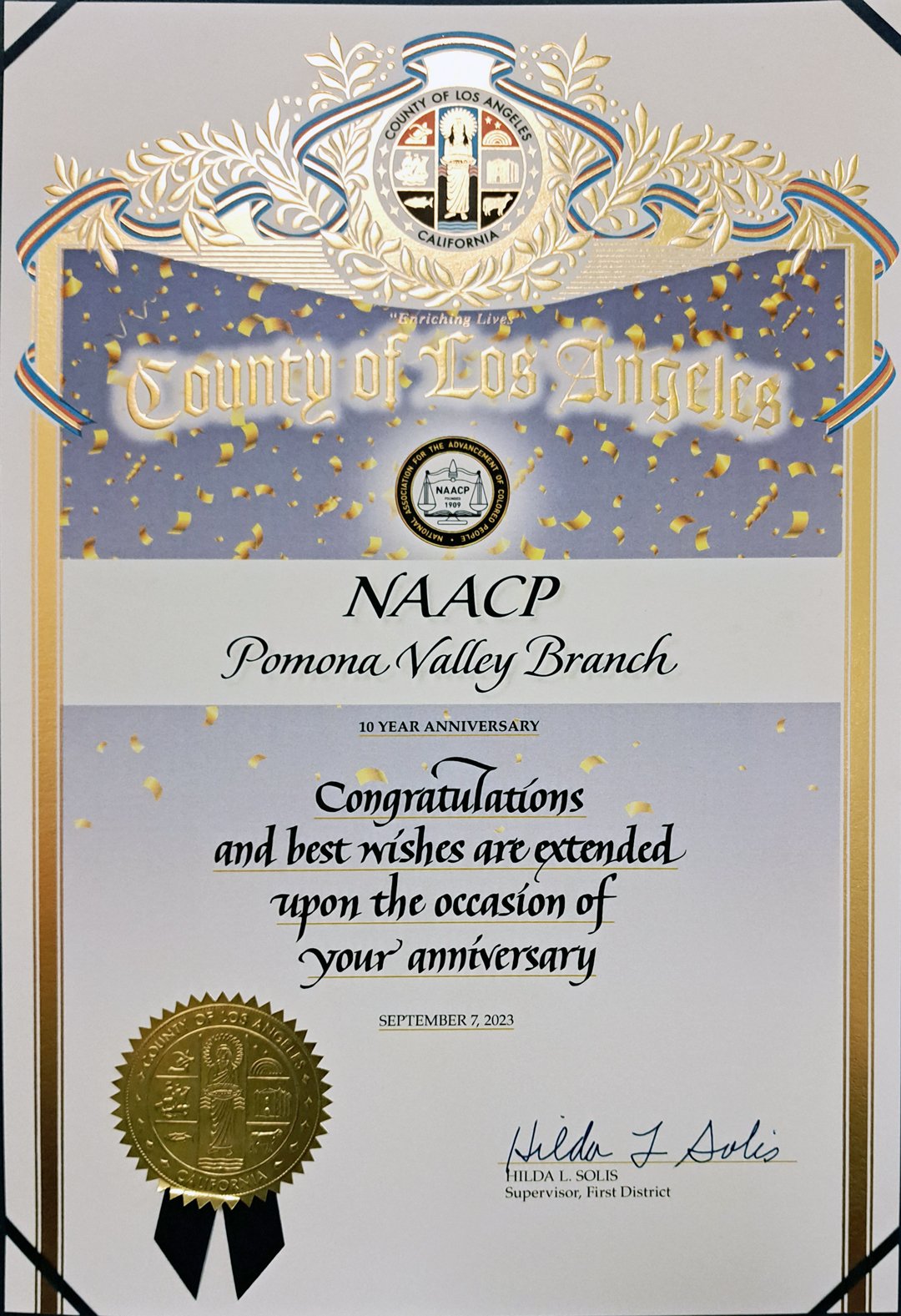
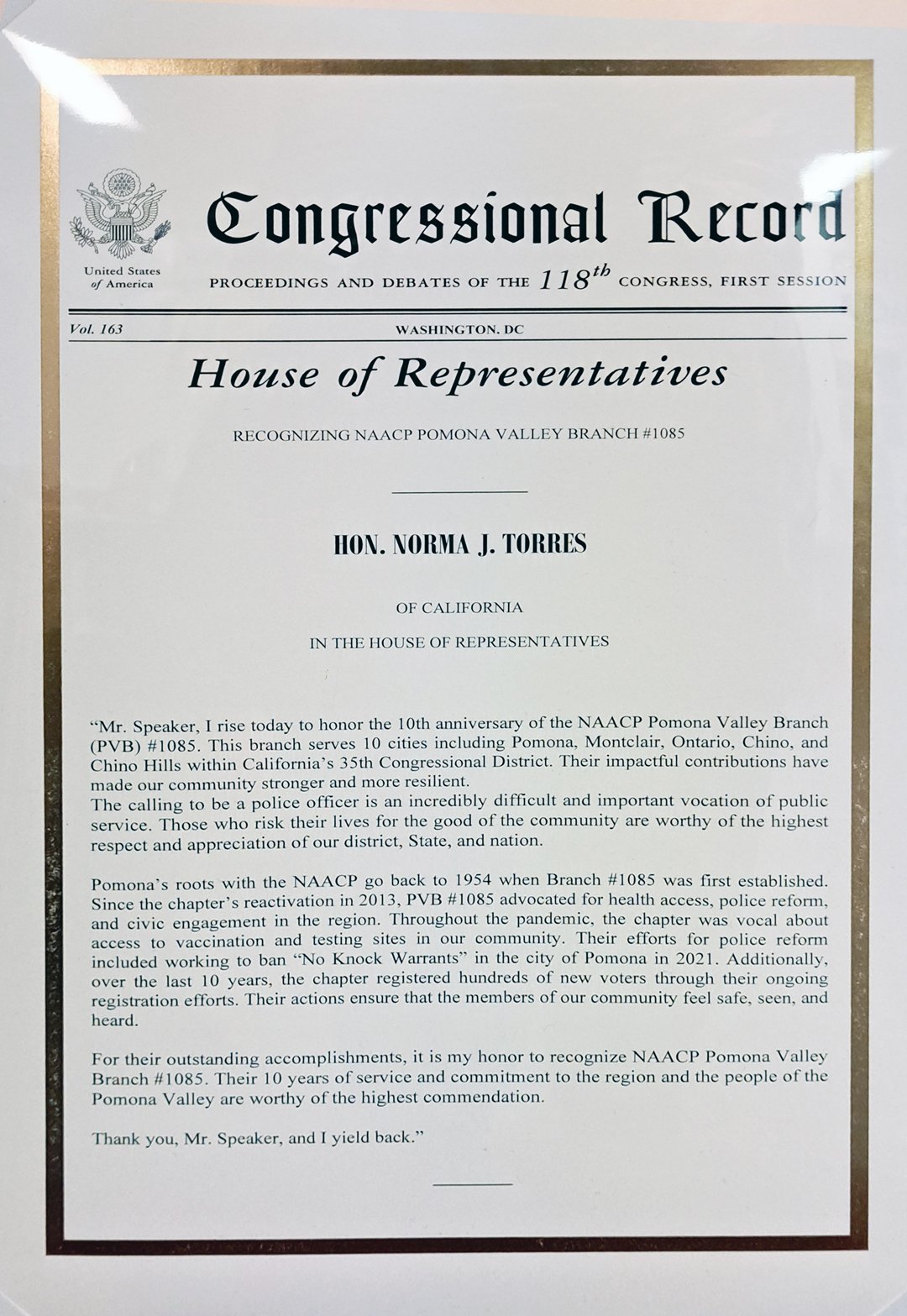
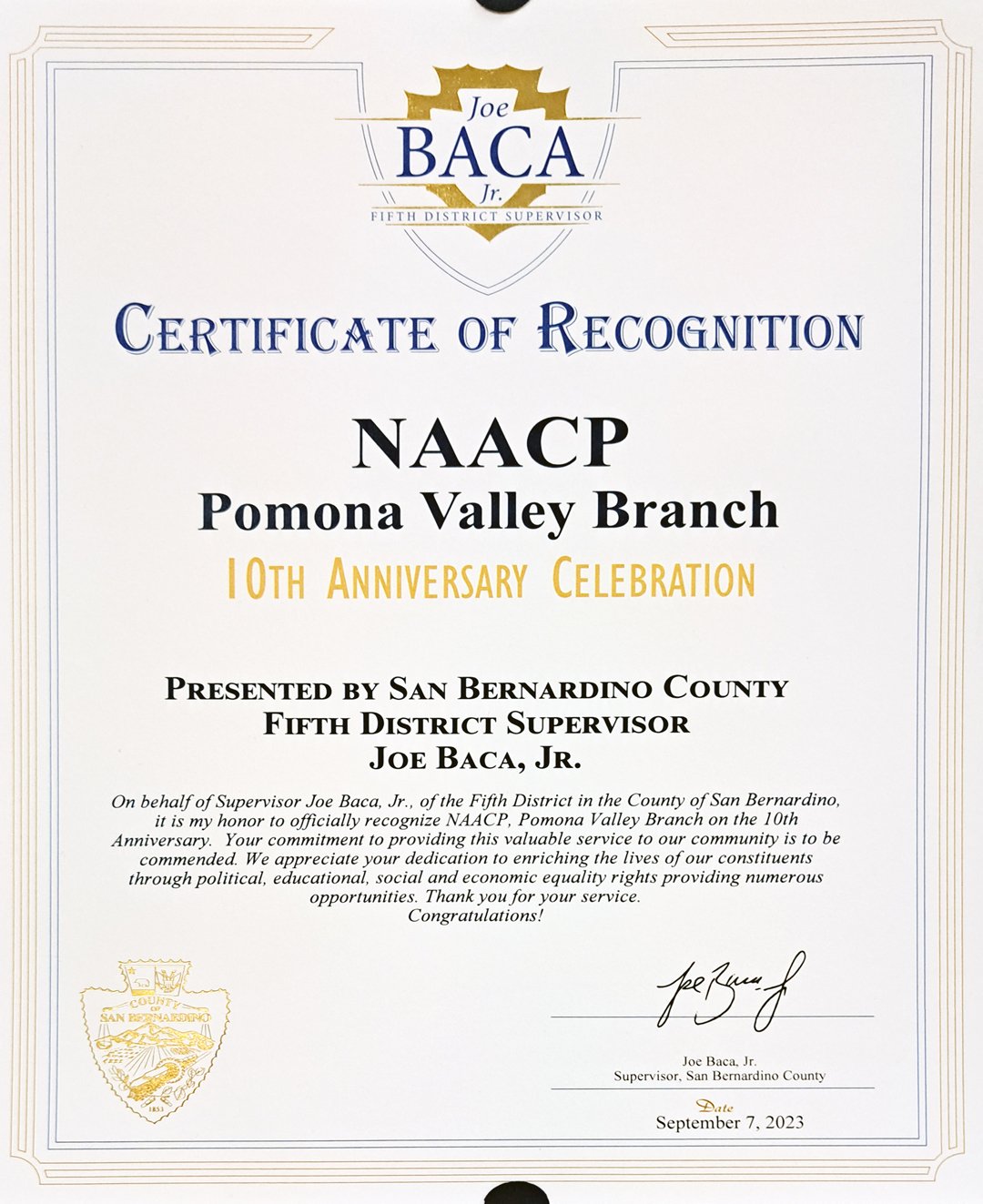
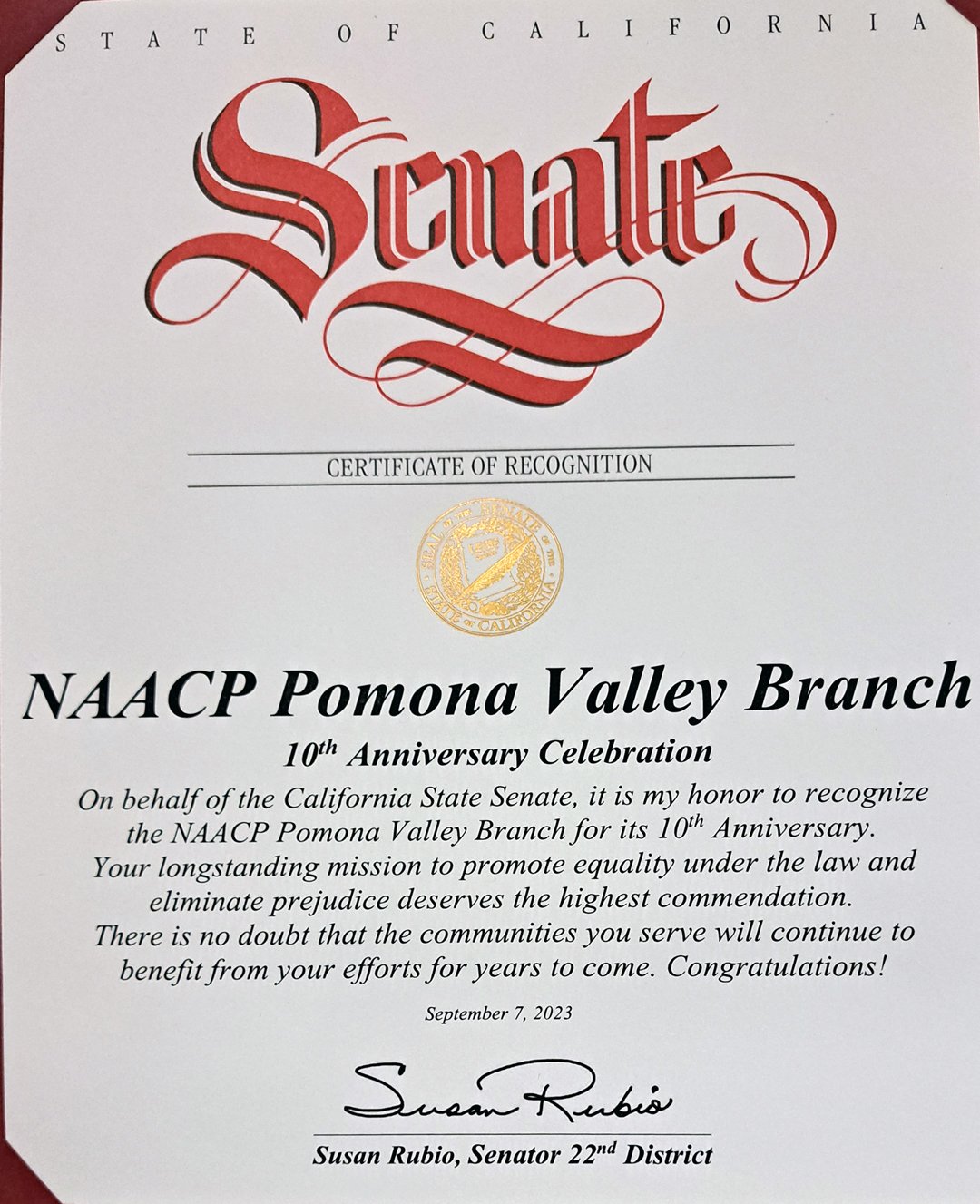
We are proud to announce the 4th Annual Virtual Graduate Salute!
Parents/Family & Friends/Fellow Students - Do you have a special 2023 graduate (Preschool - University) in your life from one of the 10 Cities that we serve (Chino, San Dimas, LaVerne, Claremont, Ontario, Pomona, Diamond Bar, Montclair, Upland or Chino Hills)?
If so, the NAACP Pomona Valley Branch would like to acknowledge them.
Please send an email to Branch President Jeanette EllisRoyston at NAACP.president.PVB@gmail.com with the following information:
• Graduate's Name
• Your Relation to the Graduate
• School/Institution & City and State
• Degree/Certificate/Diploma/School Promotion to Next Grade
• For Higher Education Only - Course of Study
• Sentence regarding future plans
• Photo [Optional]
DEADLINE:
We will share graduate highlights weekly through July 31, 2023. Send your graduate’s information today!
Stronger Together in 2023: Our Beloved Community
"Seeking 50 Veterans to participant in complete uniform"
Please call 909-620-0433 NAACP PVB office or email jrellisroyston1@verizon.net....your name and phone#
Contact: Brenda Duran
bduran@bos.lacounty.gov
213.974.1746
For Immediate Release
February 7, 2023
Los Angeles County Board of Supervisors Pass Motion Package to Strengthen Gun Regulations
LOS ANGELES - In response to the mass shooting in the City of Monterey Park that took the lives of 11 people, today, the Los Angeles County Board of Supervisors unanimously approved a series of motions authored by Board Chair Janice Hahn, Supervisor Hilda L. Solis, and Supervisor Lindsey P. Horvath to strengthen gun regulations in Los Angeles County and support gun safety legislation. This follows the Board of Supervisors’ recent action to declare gun violence a public health crisis in Los Angeles County.
“We know that blame for the gun violence epidemic lies with the failure of Congressional leaders to pass even the most basic federal gun laws. Because they have not acted — we have found actions we can take at the county level to protect lives,” said Chair Hahn.
“I intend to do whatever is possible to protect Los Angeles County residents, particularly following the tragedy in the First District community of Monterey Park. Gun-related violence will continue to cause mass damage, trauma, and harm if we do not take the necessary steps at all levels of government. This includes supporting key gun safety legislation like Senator Feinstein’s recent action to reinstate the assault weapons and high -capacity magazine ban. Today, living in the United States of America means being at risk of becoming a victim of a mass shooting. To that end, time is of the essence," said Supervisor Solis.
“We must do absolutely everything in our power to prevent and put an end to gun violence in our community. Today’s motions do exactly that,” said Supervisor Horvath. “I’m proud to advance common sense gun safety guidelines and to join my Board colleagues in our continued demand to ban assault weapons and high-capacity magazines.”
Item 2, authored by Chair Hahn, establishes ordinances to prohibit the sale of .50 caliber firearms and ammunition in the unincorporated areas of the County and prohibit the possession of firearms on County property, with certain exceptions. The motion also requests the Department of Regional Planning to prepare an ordinance to implement zoning regulations with a 1,000 feet buffer between firearm sellers and child-sensitive areas, as well as the Treasurer and Tax Collector to prepare the final amendments to the County code regarding business licenses to enhance the regulation of firearm and ammunition dealers in unincorporated areas of the County.
Item 8, authored by Supervisor Solis, directs the County's Chief Executive Office’s Legislative Affairs and Intergovernmental Relations branch to send a five-signature letter to U.S. Senator Dianne Feinstein, with a copy to the Los Angeles County Congressional delegation, in support of S.14 and S. 25 ─ legislation to raise the minimum age to purchase assault weapons from 18 to 21 and ban the sale, transfer, manufacture, and importation of military-style assault weapons, high-capacity magazines, and other high-capacity ammunition feeding devices.
Item 15, authored by Supervisor Horvath, instructs County Counsel to draft an ordinance and report back to the Board of Supervisors on requiring all firearms in a residence be securely stored in a locked container or disabled trigger lock and draft ordinance language that would mandate liability insurance for gun owners. The motion also requests the feasibility of implementing a County gun database and asks that the Treasurer and Tax prepare an amendment to the County code requiring signs to be displayed with specific language warning customers about the risk associated with access to firearms wherever they are sold.
Item 56-A, authored by Chair Hahn, directs the County's Chief Executive Office’s Legislative Affairs and Intergovernmental Relations branch to support SB 2 and SB 241 – state legislation that strengthens conceal-carry laws and requires federally licensed firearm dealers to complete annual training provided by the California Department of Justice.
According to the Gun Violence Archive, there have been 54 mass shootings in the United States since the start of the new year 38 days ago. This amounts to almost two mass shooting events a day.
NAACP Resolution Reaffirming Necessary Police Reform Policies in the United States
2022
WHEREAS, the NAACP has historically advocated for policing reform, most recently supporting those outlined within the George Floyd Justice in Policing Act of 2021, that include and emphasize the need for police accountability, transparency through data, the elimination of the use of no-knock warrants, and the standardization of comprehensive training requirements; and
WHEREAS, the doctrine of qualified immunity currently protects and shields law enforcement officers from being held responsible for malfeasance, perpetuating a culture of near-zero accountability that has resulted in approximately1,000 deaths by police shootings each year with an average of only 13 police officers charged with murder or manslaughter in the same period; and
Read the entire text: Click here
Take a breath…
Listen to what our Black Doctors have to say about COVID and the Holidays
Delegates to the NAACP State Convention 2022
Ca Hi NAACP State Conference Convention, Oct. 20 thru Oct. 23, 2022. Marriott Hotel Los Angeles. Six NAACP PVB delegates attended and cast their votes.
TWO LOCATIONS:
Sat. 17th, 2022 - Pomona Children’s Festival. from 10am thru 2pm
Sat. 24th, 2022 - Tony Ceras 450 West Grand Ave. from 1pm thru 4pm
Click here to share or view the CA/HI NAACP email in your browser
Record breaking temperatures have strained California utility grids resulting in rolling blackouts and wildfires, and there does not appear to be any immediate relief in sight. In Hawaii, air and ocean temperatures continue to rise above historic temperatures. Climate change directly impacts us all. Like most challenges in society, climate change is not sparing communities of color either.
The extreme temperatures throughout California are a reminder to our local Branches to make sure that they are discussing with their local utilities and government leaders, cooling centers and the necessary rides to the centers for our communities. Here is the list of statewide cooling centers.
The month of September is National Preparedness month and is a reminder to all about raising awareness about the importance of preparing for disasters and emergencies that could happen at any time.
The NAACP has long believed and operated under the certainty that everyone has a right to fair and equitable treatment in times of emergency and the concerns and needs of all communities should be known and adequately addressed in emergency management practices. As it is, not all communities experience equal treatment in emergency management. Even though communities of color are more likely to experience disasters, they tend to be less prepared and underrepresented in disaster response design and implementation. Thus, the systems and protocols established to address disasters often don't fully take the cultures and circumstances of African Americans, and other people of color, into account, resulting in response mechanisms that often fall short of meeting our needs.
Often, disasters hit with little to no warning, how we react, how we support our community and how we recover can ease the pain and burden through it all.
As the NAACP does best - we activate, we mobilize and we take action. Today I ask you to research local resources, draft an emergency communications plan, pack your family/business emergency kit and get involved to support on the ground when called to serve.
In the Eye of the Storm is the NAACP plan designed to guide NAACP units to activate and to mobilize their Environmental and Climate Justice (ECJ) Committees through the process of building equity into the four phases of emergency management: prevention and mitigation, preparedness and resilience building, response and relief, and recovery and redevelopment. We are fully committed to equity and justice I hope each of you take the opportunity to plan for both your family and community this month.
Your's in the Fight
Rick L. Callender, ESQ.
CA/HI NAACP
President
Make a plan to attend!
Last week, the Department of Justice charged the four officers involved in the 2020 murder of Breonna Taylor with federal civil rights violations. Back in 2020, you were one of about 1.4 million Color Of Change members who took action in response to Taylor’s murder, demanding accountability from both the Louisville Metropolitan Police Department and the DOJ.
While it does not change the fact that Breonna Taylor should be alive today, we hope that this news provides a small measure of relief to Breonna Taylor’s family. Our fight to build a safer, more equitable world for Black people continues.
You demanded justice for Breonna, and we must continue to demand justice for 25-year-old Jayland Walker. In June, eight Akron Police Department officers shot at Jayland more than 90 times in seven seconds after a “routine” traffic stop. Jayland suffered 46 gunshot wounds and died. Those officers are still on paid administrative leave.
The 988 hotline is live and open now. ***
988 Suicide & Crisis Lifeline (Launched on July 16, 2022)
A national network of local crisis centers that provides free and confidential emotional support to people in suicidal crisis or emotional distress 24/7 throughout the U.S. via phone call, text messaging, or online chat. (Please note that longstanding phone number for the National Suicide Prevention Lifeline at (800) 273-8255 will remain operational after July 16, 2022)
Credit: LA County Department of Mental Health
https://dmh.lacounty.gov/get-help-now/
May 25, 2022
PUSD SUPERINTENDENT RICHARD MARTINEZ’S STATEMENT ON VIOLENCE IN OUR NATION AFFECTING SCHOOL CHILDREN IN ALL U.S. COMMUNITIES
Pomona Unified School District Students, Staff, and Families:
Our hearts go out to the staff, kids, and families of the Robb Elementary School community in Uvalde, Texas. As well, our condolences are with the families of the grocery store shoppers who were massacred in Buffalo, NY. We also send our warmest thoughts to the families of the church members in neighboring Orange County who were shot and wounded as they worshipped. As a nation, as a community, and as a school district, we are all grappling with trying to understand the cause of routine and senseless violence within our nation’s communities and schools.
As a parent, I am keenly aware of the angst that is felt when parents and students question whether it is safe to continue going to school, shopping in a grocery store, and/or worshipping in church. We all have an expectation that our child(ren) will be safe at school, in the market, or within worship services. I encourage us to continue working together as a school community to provide the safest and richest learning environment for all of our students. While we struggle with controlling the elements in our nation, we can certainly continue to refine our collaborative efforts for the benefit of every single PUSD student.
Pomona Unified School District is committed to ensuring the safety of our schools, and we could always use the added support of watchful parents and guardians. Safety is a wrap-around and around-the-clock effort. Every set of eyes and ears focused on the maximum safety of our students creates a stronger safety barrier. Whenever you see or hear something, please say something. We wholeheartedly welcome these efforts. We all play an important role in safety.
Our promise to you as a parent, a staff member, and as a student, is that our district will always prioritize training and the alignment of resources to support physical and mental health. We are in this together! We will weather the storm of violence in our nation together as a solid and unified district comprised of knowledgeable staff, loving parents, and inspired students.
Please take time to review the following resources and converse about seeing something, and saying something to the appropriate authorities (PUSD Crisis Support Resources).
Respectfully,
Richard Martinez
Superintendent
Primary elections have begun. Soon you will begin seeing anti-voter laws in action: limiting the number of drop boxes in high-density areas, purging voting rolls, and adding obstacles for working people, seniors, young, and first-time voters. That’s why your support of the League is crucial.
This election cycle could decide the fate of many important issues, like climate change and a woman’s right to choose. That’s why it’s so important to know how the new voting laws will affect you and what you need to do right now to be prepared to vote.
At least 18,000 ballots have been rejected in the March Texas primary election thanks to the controversial new voting law, SB-1. Pam Gaskin, a member of the League of Women Voters of Houston for more than 25 years, almost missed the deadline after having her application for a mail-in ballot rejected twice this year. Pam has been voting by mail for six or seven years, without incident. This time around it was a nightmare. Pam says, “They’re making voting hard. Period.”
Devorah Lieberman, PhD
President
I am thrilled to share with you that the University of La Verne is now accepting applications for a bachelor of science in nursing program (BSN) designed to help registered nurses (RNs) further their careers and enhance their leadership skills.
The Bachelor of Science in Nursing: RN to BSN is the first new program to be created through our College of Health and Community Well-Being, which officially opens this summer, and the first nursing program to be offered at the University of La Verne.
Both the nursing program and college are distinctive in that they will place special emphasis on teaching how health inequities and social determinants can negatively impact health and well-being outcomes at the individual and community levels.
Rapid changes in the healthcare landscape, both in private and public health, have accelerated as a result of the COVID-19 pandemic, creating shortages of all types of healthcare positions, especially nurses.
As more hospitals seek Magnet status, more nurses will be required to have a bachelor’s degree or higher, and many nurses do not currently have these degrees. Our new nursing degree will help hospitals achieve Magnet status by empowering nurses to enhance their knowledge and skills, as well as aid in their job security and professional mobility.
The University of La Verne is a pioneer in adult education and has provided flexible degree programs for working adults for more than 50 years. We also have a decades-long history in offering health-related degree programs.
As a designated Hispanic-Serving Institution, we are uniquely suited to train a diverse student population to understand and meet the needs of a growing multicultural region.
Our partnerships with many Southern California health care providers and community colleges allow us to provide scholarships and smooth transfer of college credits for employees or students from those organizations.
The first cohort of Bachelor of Science in Nursing: RN to BSN students will begin this fall. Additional new programs in nursing and other health and well-being related fields are planned for the next few years, including a pre-nursing program for freshmen in fall 2023, to build upon our existing array of health-related undergraduate and graduate degrees.
The University of La Verne will be a leader in making our communities healthier and well. Thank you for being on this journey with us.
EMOTIONAL HEALTH IS WEALTH
Interactive Meditation - Part 2
Welcome back for the next session with Ms. Neesa L. Johnson, CHC, LMT. This interactive three-part series will offer mindfulness tools and techniques for manifesting and creating greater emotional resiliency in 2022.
In part two of the series, Ms. Johnson will offer tools and tips on how to be present and experience more joy this year by bringing awareness and attention to your breath.
Date: Thursday, February 10, 2022
Time: 7pm - 8:30pm EST
NCNW APPOINTS 8TH NATIONAL PRESIDENT AND CHAIR
Dr. Thelma T. Daley Elected to Lead NCNW During its 87th Year
Washington, DC — Wednesday, February 8, 2022 — The National Council of Negro Women (NCNW) is pleased to announce that Dr. Thelma Thomas Daley has been named 8th National President and Chair of the organization. Continuing to live a life of service, Dr. Daley is stepping up from the Vice President position. The Honorable Alexis Herman, Senior Advisor to the NCNW Executive Committee, said “Dr. Daley is well-known, much beloved and proven leader of national and international organizations. Dr. Daley served as a National Vice President of NCNW and understands well the mission, the goal, and the urgency of the work we do.” Dr. Daley succeeds Dr. Johnnetta Betsch Cole who resigned effective January 31, 2022.
At her swearing in on Wednesday, February 2, 2022, Dr. Daley said, “My goal is to coalesce the total membership around the many needs to be fulfilled. To reach our goals we must break barriers, build bridges and climb mountains.” Dr. Daley has a long, sustained record with NCNW and will apply her vast experience and skills to lay a foundation for continued strategic growth, program impact and relevancy, building on the organization’s successes.
Dr. Daley blazed trails in the counseling profession and served as the first African
American president of The American Counseling Association, the largest counseling association in the world. She believes in finding “the best in others and helping them to find their possibilities.” As an activist, she has broken many barriers, including becoming the first woman to chair the National Advisory Council on Career Education. Some of her other civic and charitable activities include breaking the barrier to become the first Black president of the American School Counselor Association. She was also president of the Women in Community Services and served as national director of Women in NAACP (WIN). Additionally, she served as the 16th National President of Delta Sigma Theta Sorority, Inc., an organization with more than one thousand chapters and 350,000 inducted members.
The Hon. Alexis M. Herman indicated, “Our members are excited to know that Dr. Daley is taking the helm of NCNW at this critical moment and know that she will continue to inspire the members and stakeholders to reach higher heights. We know that she will continue to empower our members because she has the passion, skills and vision to execute the mission to lead, advocate for and empower women of African descent, their families and communities.”
CIVIL RIGHTS GROUPS: ELECTORAL COUNT ACT IS INSUFFICIENT, PROTECTING THE RIGHT TO VOTE IS ESSENTIAL
Washington, DC — Wednesday, January 31, 2022 — Leading civil rights organizations released the following joint statement urging Congress to remain focused on federal voting rights protections and the core issue of racial discrimination addressed in the John Lewis Voting Rights Advancement Act and the Freedom to Vote Act, as the Electoral Count Act is grossly insufficient:
“The right to vote is our most sacred right. We must ensure that voters can safely and freely cast their ballots. The Electoral Count Act proposal would provide important and needed protections to ensure the integrity of the presidential election of 2024, but it does not address the ongoing pernicious and pervasive racial discrimination in voting nor does it make voting more accessible."
“Bringing clarity to the certification of presidential elections is hollow, if the right to vote itself is not safeguarded. Pursuing this bill alone as a compromise on voting rights reform is offensive to voters, especially voters of color, and the generations who bled and died for the franchise since our nation’s founding. Bipartisanship for bipartisanship’s sake does nothing for a citizen whose right to vote has been compromised by partisan extremists in states. Worse, some might view this effort as a cynical attempt to fool the American people into believing meaningful action has been taken on voting rights when none has been taken. We won’t participate in that charade."
“Compromise is a worthy goal, but any compromise on voting rights must center on tearing down barriers to the ballot for Black people and other people of color, Native Americans and Alaskan Natives, people with disabilities, senior citizens, veterans, new Americans, and young people. We must move forward to protect the voice and vote of every American. Our democracy remains on the line. This year, elections for the Senate, the House, governors, school boards, secretaries of state, county commissions, district attorneys, and more will be held in states where new anti-voter laws have been enacted. Congress must include the John Lewis Voting Rights Advancement Act and key provisions of the Freedom to Vote Act in any legislation that is considered to safeguard our democracy.”
This statement was signed by the following organizations:
National Council of Negro Women Executive Director Janice L. Mathis
National Coalition on Black Civic Participation/Black Women’s Roundtable President and CEO Melanie Campbell
The Leadership Conference on Civil and Human Rights Interim President and CEO Wade Henderson
Lawyers’ Committee for Civil Rights Under Law President and Executive Director Damon Hewitt
NAACP Legal Defense and Educational Fund, Inc. (LDF) President and Director-Counsel Sherrilyn Ifill
NAACP President and CEO Derrick Johnson
National Urban League President and CEO Marc H. Morial
National Action Network President and Founder Reverend Al Sharpton
Artificial Intelligence is a Civil Rights Issue
Masheika Allgood AI Ethicist, AllAI Consulting, LLC, Presents a discussion about Civil Rights in the 21st Century.
NAACP Pomona Valley Branch participates in the Pomona Christmas Parade, December 11, 2021
Black Women Leaders & Allies Return to Washington DC to Lead Freedom Walk, Voting Rights Rally / Direct Action Urging Congress to Pass Critical Voting Rights and Economic Justice Legislation
Join us on Wednesday, December 8th for the next Black Women Leaders & Allies Freedom Walk for Voting Rights and Economic Justice! We need you there to urge Congress to end the filibuster and protect our voting rights. Learn more and register at BlackWomenTakeAction.org. #ProtectOurVotingRights #BlackWomenTakeAction
Owe Rent? Facing Eviction? There's Help for You!
Don't Miss Saturday's Stay Housed Pomona Workshop from 10 to noon!
If you or someone you know is behind on rent or facing a possible eviction, there is help available! Tomorrow, Saturday, Dec 4—from 10 AM to noon—Stay Housed LA, in partnership with the City of Pomona and the Pomona Economic Opportunity Center will present a workshop on Zoom with everything you need to know. Please join us! Here is the Zoom link: https:bit.ly/stayhousedpomona
Watch the October 21st presentation by Masheika Allgood below:
NCNW President's Response to the Failure to Adopt George Floyd Justice in Policing Act
It sickens me that members of the United States Senate have not come together on the most basic, the most fundamental of issues, the security of human life, and have failed to reach an accord on the adoption of the George Floyd Justice in Policing Act. Clearly, watching the slow death of a man at the hands of those who were sworn to “protect and serve” should be enough. The failure to act to prevent such heinous behavior is not only a reflection on police – it is an indictment of the entire legal system.
There is no debate. There is nothing to argue. Right is right and wrong is wrong. What happened to George Floyd and to too many other African American women and men in this country is emphatically wrong. We have not forgotten Sandra Bland or Breonna Taylor. We continue to say their names. The unwillingness of the Senate to enact legislation to establish national standards for the use of force and to hold officers who violate those standards accountable is a dereliction of their duty to the American people that cannot be tolerated.
People across the globe joined in massive protest against the brutal tactics that resulted in George Floyd’s death. I am in touch with a person from Brazil who reports that the George Floyd murder is spurring demands for police reform in that nation.
Yet, here in the United States, the Senate refuses to act in the national interest to prevent more terror and death at the hands of police. The most responsible police organizations recognize the need for change. The House of Representatives acted swiftly to enact the George Floyd Justice in Policing Act. Minnesota Attorney General Keith Ellison did his duty and a jury convicted Derek Chauvin of murder. Senator Booker and Representative Bass negotiated in good faith, to no avail. It is apparent that the failure to hold law enforcement to reasonable standards lies on the desk of the leaders of the United States Senate.
The failure to enact the George Floyd Justice in Policing Act is an insult to George Floyd’s family and to all the families who have suffered similar tragedies. But it is also an assault on democracy. Many of the masses of young people – of all races and places – who gathered in protest were compelled by the desire to end police brutality to vote for the first time. We are saying to them and to the world that democracy is a hollow promise and is an ineffective tool for social change.
To those recalcitrant leaders who, in the quest for raw political power, refuse to heed the voice of the people, rest assured that the issue of police accountability is not finished and it will not go away. People of goodwill everywhere will continue to work for solutions. State and local governments will enact laws. The Department of Justice will conduct pattern or practice investigations. Responsible members of law enforcement will reform their practices. The people are united in the quest for fair and responsible policing and they will not be denied.
Onward,
Johnnetta Betsch Cole, Ph.D.
Chair and Seventh President, NCNW
GEAR UP FOR DENIM DAY
Domestic Violence is unacceptable - NAACP PVB joins the fight
Wear your JEANS ALL DAY
WEDNESDAY- APRIL 28, 2021
5 questions with author and STEM activist Sasha Alston
As many California families - including renters and landlords - continue to struggle, I would like to share important information regarding assistance that has recently become available.
Income eligible households that need financial assistance for unpaid rent and utilities are able to apply for help through the California COVID-19 Rent Relief program. If you have experienced a financial hardship due to COVID-19, have past due rent or utilities, and have a household income that is not more than 80% of the area median income, you may be eligible to receive help to pay past due or future rent and utilities. Landlords and renters can verify eligibility by visiting HousingIsKey.com or by calling 833-430-2122 and, if eligible, apply.
Who can apply?
Landlords
Renters
The N.A.A.C.P. on Tuesday morning (Feb 16, 2021) filed a federal lawsuit against former President Donald J. Trump
2021.02.16
The Pomona Valley Branch of the NAACP led Pomona to victory in passing Breonna’s Law—a complete BAN on No-Knock Warrants in the City of Pomona, CA on Monday, February 1, 2021. The purpose of this NAACP initiative is to prevent the loss of life of Pomona residents and police officers, due to confusion or human error when police enter a home to serve a warrant without first identifying themselves and knocking.
The Pomona City Council adopted Breonna’s Law unanimously (7-0) on the first day of Black History Month, honoring the memory of Breonna Taylor--the young woman who lost her life in a no-knock raid in Louisville, Kentucky. Although Pomona rarely uses this tactic, in the past residents have experienced trauma due to no-knock raids in their homes.
This BAN ends this practice and is a step forward in strengthening public safety and trust with law enforcement. The effort was led by NAACP President Jeanette Ellis Royston. The team who worked to establish the ban included: Pastor Ivory Brown (1st Vice President, NAACP), District 3 Council Member Nora Garcia, District 2 Council Member Victor Preciado, and Mrs. Lisa Engdahl (Pomona resident).
Under Ms. Ellis Royston’s leadership, the team has met since August of 2020, including several months of meetings with Police Chief Mike Ellis. Chief Ellis invested significant time in understanding the NAACP’s concerns, and although he recommended a different policy to the Pomona City Council, honored the NAACP by agreeing to have both policies brought forward to the council with mutual respect. Many Pomona residents, clergy, and community leaders turned out to speak in favor of this BAN.
Together we are Stronger.
Space is limited.
RSVP NOW!
We The People!... MUST GOTV SO THAT THIS NEVER HAPPENS AGAIN.
WE MUST SUPPORT VOTER’S PROTECTIONS - JOHN LEWIS'S LEGACY...
The Nation’s Capitol under siege
“Jan. 6 is not merely about former President Donald Trump's failed grasp for everlasting power. That day also shows the fragility of our democracy. And it would be hypocritical for either side of the political aisle to blame the other. White supremacists attempted a coup live on national television to block the counting of presidential election votes.
And now the party in control of both houses of Congress has failed to get legislation to the president that would protect the voting rights of Americans. They could do this alone, but a select few are choosing to sacrifice this dire civil rights concern for the optics of bipartisanship.”
Read the rest of the Op-Ed here.
Today, we remain steadfast in our commitment to defend that democracy and the freedoms which it guarantees. To do so, we must turn our attention to passing voting rights legislation with urgency.
Far too many have fought, bled, and died for us to sit idle on voting rights.
Our elected officials must use all the tools at their disposal to preserve our franchise. It’s the only way our democracy can last.
In power,
Derrick Johnson
@DerrickNAACP
President and CEO
NAACP
Tuesday, December 8, NAACP leaders will meet with President-Elect Biden and Vice President-Elect Harris.
After four years of an administration that was unconscionably hostile to civil rights, we pushed for a meeting with the incoming administration to share our concerns and put the issues that matter to you firmly on the agenda.
This has been an incredibly difficult year for our community, and if we are to build back better as the Biden-Harris transition team promises, we must center these efforts on racial equity and social justice, and we must address this country’s most pressing needs: COVID-19 relief and Affordable Healthcare, Student Loan Relief, Criminal Justice Reform, and Economic Empowerment.
Despite the many challenges we faced this year, the American people – especially Black men and women – broke down insurmountable barriers to elect this new president because they wanted a change. And we requested this audience with President-Elect Biden to demand that change.
We are honored to advocate on your behalf and we are excited about this new era in American democracy – one where we can work in tandem with the new administration to tear down systemic racism and the marginalization of the Black community.
We are hopeful that next week’s meeting will be the first of many with President-Elect Biden and Vice President-Elect Harris.
In Solidarity,
Derrick Johnson
@DerrickNAACP
President and CEO
NAACP
OUR NATION MAKES HISTORY AND HERSTORY
November 7, 2020 is a truly historic and herstoric day in our nation. As a candidate for the presidency of the United States, Vice President Joseph R. Biden broke the record of President Obama for the most votes ever cast for a U.S. presidential candidate. And Senator Kamala Harris will be the very first woman, the very first Black woman and the very first woman of South Asian descent to serve as the Vice President of our country.
Dear National Council of Negro Women family, thank you for doing all that you did during this election season. You worked to get out the vote, you served as poll monitors, and you exercised your own right to vote. Over these last few months in our sections across the country, you my sisters participated in collaborations and coalitions, you taught basic civics to first time voters, and you donated your time, talent and treasure to the noble cause of getting out the vote. Once again, we Black women were souls who went to the polls in very large numbers. Once again, we Black women heeded the call of our President Emerita Dr. Dorthy Irene Height when she said that Black women always do what we have to do.
The people have spoken. And now our voices must be heard and heeded in the interest of creating a more promising future.There is much that will be demanded of each of us to address the divisiveness in our nation, and to support the continuing American project of becoming a more perfect union. NCNW must play a role in unifying our nation while systematically working for women’s rights and civil rights, indeed for human rights. We must speak up and speak out on issues of criminal justice reform, climate change, health care, poverty and the COVID-19 pandemic. As Black women we must honor our responsibility to work for a better world for our children. And as our founder Dr. Mary McLeod Bethune did in her day, we must do our part to help our nation to be a true beacon of freedom and equality.
Onward!
Johnnetta Betsch Cole, Ph. D.
National Chair and Seventh President, NCNW
Newsom signs high-profile bills
Gov. Gavin Newsom signs the reparations bill over Zoom on Sept. 30, 2020. Screenshot via YouTube
As historic protests against police brutality and racism continue to sweep across California and the nation, Gov. Gavin Newsom on Wednesday signed into law a spate of racial and criminal justice legislation and several police reform bills — though the most ambitious police proposals never made it to his desk.
Among the bills to which Newsom gave his stamp of approval:
A bill requiring the state Department of Justice to independently investigate some police killings.
A bill banning law enforcement from using chokeholds and neck restraints.
A bill closing California’s Division of Juvenile Justice, shifting the responsibility for youth offenders from the state to counties.
A bill wiping away debt owed by parents for the costs of their children’s incarceration in the juvenile justice system.
A bill establishing a reparations committee to recommend ways the state could compensate African Americans for slavery and its consequences.
All of these were introduced before a Minneapolis police officer killed George Floyd in May, setting off a chain of protests that prompted both Newsom and lawmakers to promise sweeping reforms that would fulfill “our unique responsibility to the Black community.” Still, the most controversial policing proposals — including a bill to strip bad cops of their badges — stalled in the Legislature, and others were watered down.
Newsom, as he signed the policing bills: “None of these bills are easy. But I think under the circumstances, the fact that we were able to get this far is a big deal.”
Now here’s a look at key bills Newsom vetoed Wednesday — the deadline to take action on bills from the legislative session.
A bill that would have created pilot programs to remove police from the response to crises involving mental illness, homelessness, natural disasters and domestic violence.
A bill that would have made ethnic studies a high school graduation requirement.
A bill that would have closed a loophole in California’s school finance law by requiring districts to report unspent dollars intended for students who are low-income, foster youth or English learners.
A bill that would have required hotel, airport and janitorial employers to first rehire workers laid off amid the pandemic.
NCNW Congratulates Vice Presidential Candidate, Senator Kamala Harris
The National Council of Negro Women congratulates Senator Kamala Harris on her nomination to become the next Vice President of the United States. Over the long arc of her career, Senator Harris has proven her exceptional leadership ability, always rising to the demands of the position, from District Attorney, to Attorney General of the nation’s most populous state, to the United States Senate, making her the highest ranking Black woman in the Congress.
Purchase, this t-shirt and other apparel, click the image below:
Today and every day, we celebrate the legacy of Dr. Martin Luther King, Jr.
As the pastor of Ebenezer Baptist Church where Martin Luther King Jr. once served, I know this: This MLK Day, more than anytime before, his teachings and the legacy he left behind for all of us is precisely what this nation needs to begin the difficult process of unifying.
During this harrowing month, in which our democratic institutions were tested, we once again witnessed two vastly different systems of justice in action -- making this day for reflection, remembrance, and activism all the more important.
As Martin Luther King Jr. once said, “Injustice anywhere is a threat to justice everywhere.” Well, we saw firsthand just how true that is not only a few weeks ago, but over these past four years.
With the upcoming historic presidential inauguration of Joe Biden and Kamala Harris, I hope that you will take a moment to reflect on the hard work that brought us to this moment. And I hope that you will remember that we all stand on the shoulders of giants like Martin Luther King Jr., who stood steadfast in his relentless pursuit of justice.
Just two days from now, folks across the country and around the world will not only witness the swearing-in of Joe Biden -- but of Kamala Harris, the first African-American and South-Asian female Vice President in the history of the United States of America. Soon after, we’ll get to work bringing compassion and justice back into our policy and begin the hard work of building back better.
Make no mistake: None of this would be possible without the unwavering support and dedication of supporters like you -- thank you. Together, we have come such a long way, but we still have so far to go.
On this critical day of reflection, reverence, and celebration, we must recommit to our fight to form a more perfect union. As Democrats and as Americans, we must also be relentless in our pursuit of justice and continue working to create an America that represents all of us. Today, and every day, our fight for justice continues.
In solidarity,
Raphael
Reverend Raphael Warnock
U.S. Senator-elect, Georgia
The Newly Elected Board…
“NAACP BLASTS FACEBOOK FOR MISSING THE MARK ON LATEST POLICIES TO COMBAT DISINFORMATION AND HATE SPEECH”
“The NAACP is concerned with Facebook’s recent tone-deaf response to the growing outcry over its platform’s inaction against hate. While Facebook claims to support ‘free speech,’ in actuality, they are allowing hate speech to run rampant. Today, Facebook stated they would apply their hate policy to ads as if it was new ideation, while not addressing hate more broadly in groups and posts. Voter misinformation may be harder to spread the day of the election (but still will run rampant the rest of the time). And posts that call for violence will still be allowed if they come from someone ‘newsworthy,’ but will now be labeled. None of this will be vetted or verified – or make a dent in the problem on the largest social media platform. We have been down this road before with Facebook. They have made apologies in the past. They have taken meager steps after each catastrophe where their platform played a part. But this has to end now.” Recommended Next Steps Accountability
1. Establish and empower permanent civil rights infrastructure including C-suite level executive with civil rights expertise to evaluate products and policies for discrimination, bias, and hate. This person would make sure that the design and decisions of this platform considered the impact on all communities and the potential for radicalization and hate.
2. Submit to regular, third party, independent audits of identity-based hate and misinformation with summary results published on a publicly accessible website. We simply can no longer trust Facebook’s own claims on what they are or are not doing. A “transparency report” is only as good as its author is independent.
3. Provide audit of and refund to advertisers whose ads were shown next to content that was later removed for violations of terms of service. We have documented many examples of companies’ advertisements running alongside the horrible content that Facebook permits. That is not what most advertisers pay for, and they shouldn’t have to. Decency
4. Find and remove public and private groups focused on white supremacy, militia, antisemitism, violent conspiracies, Holocaust denialism, vaccine misinformation, and climate denialism.
5. Adopting common-sense changes to their policies that will help stem radicalization and hate on the platform.
6. Stop recommending or otherwise amplifying groups or content from groups associated with hate, misinformation or conspiracies to users.
7. Create an internal mechanism to automatically flag hateful content in private groups for human review. Private groups are not small gatherings of friends - but can be hundreds of thousands of people large, which many hateful groups are.
8. Ensure accuracy in political and voting matters by eliminating the politician exemption; removing misinformation related to voting; and prohibiting calls to violence by politicians in any format. Given the importance of political and voting matters for society, Facebook’s carving out an exception in this area is especially dangerous. Support
9. Create expert teams to review submissions of identity-based hate and harassment. Forty two percent of daily users of Facebook have experienced harassment on the platform, and much of this harassment is based on the individual’s identity. Facebook needs to ensure that their teams understand the different types of harassment faced by different groups in order to adjudicate claims.
10. Enable individuals facing severe hate and harassment to connect with a live Facebook employee. In no other sector does a company not have a way for victims of their product to seek help.
The above are not sufficient, but they are a start.
“Legendary Grammy and Oscar Award winner Lionel Richie made a huge announcement on Jimmy Kimmel Live this week— Lionel Richie is supporting the NAACP and our efforts to address the tragedy and unique challenges the COVID-19 pandemic is putting on the Black community. ”
Jail-building Contract Canceled, Prioritizing Rehabilitation over Punishment
Want to stay up to date with NAACP 110th’s annual convention? Here are some helpful tips:
Download the NAACP Convention Mobile App for your Apple or Android device.
Catch up on the latest news and announcements about the convention.
Review our NAACP Convention Social Media Guide.
Submit a question for the Presidential Candidates Forum.
Watch the Convention on our livestream.
Tune in!
Reimagining Pomona
March 4, 2019
Mayor Tim Sandoval’s Remarks
He called on residents and business leaders to help him once again take ownership of the city and help reimagine Pomona’s future. The city can only get there, Sandoval said, if it focuses on two things: the people and institutions.
He commended such organizations as the NAACP and Latino/Latina Roundtable, whose members “continue to advocate for the state’s most vulnerable students to have access and support at our public universities in an effort called ‘College for All.’”
CENSUS PREPARATIONS MOVES FORWARD
January 30, 2019
Federal judge denies Census Bureau motion to dismiss suit over inadequate government preparations for the 2020 Census
The National Association for the Advancement of Colored People (NAACP) and its allies today won a major court ruling that allows them to proceed with a federal lawsuit challenging the government’s inadequate preparations for the 2020 Census.
The Three-Fifths Compromise of the Constitutional Convention in 1787 counted enslaved Black people as three-fifths of a person in apportioning congressional districts. And ever since that time, the Census has continuously severely undercounted communities of color.
Say Her name
January 21, 2019
Documentary Sandra Bland "Say Her Name"
Celebrate Martin Luther King Jr. Birthday with your community
PALA Action Planning Workgroup
August 7, 2018
Jeanette Ellis-Royston Gave Testimony at the PALA Action Planning Workgroup with City and County Representatives
Jeanette EllisRoyston and Jose Calderon
Collaboration leads to opening of joint office
February 19, 2018
During a little more than three years, the Pomona Valley Branch of the NAACP and the Latino-Latina Roundtable of the San Gabriel Valley and Pomona Valley have been partners on various matters tied to issues such as social justice, education, voting rights and immigration.
Members of both organizations have marched together multiple times. The first time was in December 2014 when the NAACP and the Roundtable held a peace march in solidarity with those who have been victims of violence committed by members of law enforcement across the country. They've walked together as part of the Cesar Chavez Pilgrimage honoring the legacy of the late civil rights leader, said Jose Calderon, president of the Roundtable.
"Federal immigration policies will not be enforced by sheriff's department, Pomona police"
May 25th, 2017
"We don't have time for that,” said Capt. Andy Berg of the Sheriff's Department's San Dimas station. "We really are not too interested in immigration status. We have a lot of public safety concerns, trying to address violent crimes... and the sheriff's department does not view immigration enforcement as part of our daily duty."
"What residents really told police officers when they got a chance in Pomona"
May 19, 2017
More than 75 people, representing eastern Los Angeles County communities and more than two dozen members of nine area law enforcement agencies, gathered at the Village Conference Center in Pomona on Thursday night to hear from each other and to strengthen police-community relations.
The Truth and Reconciliation program, organized by the Social Justice Advocacy Project in conjunction with the NAACP Pomona Valley branch, is part of an ongoing effort meant to bring the public and law enforcement together to discuss issues of community concern and find solutions together, organizers said.
Woman of the year spent life advocating for others
April 6, 2017
Longtime Claremont community activist, volunteer and senior citizens' advocate Sandy Hester was recently recognized for her numerous accomplishments and contributions to the region with a Congressional Woman of the Year Award from Rep. Judy Chu, D-Pasadena.
Community Event Series
ESGV Community-Oriented Policing Strategies Task Force
City Limits: where the local government ends and the community begins in addressing community issues.
Truth and Reconciliation
Organization Updates
Legal Clinics
Financial Literacy Workshops
Building Bridges of Understanding
Featured Articles
Five Rules to Leading an Empowered Life
Education: Perpetuating Oppression or Provoking Liberation
Repeal the Indiscriminate Killing of People of Color: CA Prop 62
Advocacy Alert!
Pomona delegation honored
July 28, 2016
Woman of the Year Jeannette Ellis-Royston was recognized as an active civil rights leader and expert in the community. "She has earned a strong reputation as a dedicated volunteer and advocate for the people of Pomona," Hemming said. She serves as President of the Pomona Valley Branch NAACP, has been effective in bringing law enforcement and the community together to build stronger working relationships, and prides herself on inclusiveness, Hemming added.
jeanette ellisroyston
L.A. County Board of Supervisors
Passed Parks & Open Space Measure
Ruth Carter,
NAACP Life Member,
April, 2016
Responses to Islamophobia
May 8, 2016
"Islamophobia prompts Pomona group to start dialogue to create a more united, peaceful community"
The Dec. 2 terrorist attacks in San Bernardino and in other parts of the world have made some people fear members of the Muslim faith, said a Pomona activist.
To break down barriers and build relationships, the NAACP Pomona Valley branch, in collaboration with area faith leaders, will host a community dialogue from 6 to 8 p.m. Monday at the Village Conference Center, 1460 E. Holt Ave. The center is accessed via Entrance No. 1.
"By building a community, we all feel safe and we can rally around those who don't feel safe," said Jeannette Ellis-Royston, president of the NAACP Pomona Valley branch.
Pomona NAACP NIght at the African American Museum of Beginnings
Local NAACP Sets its Sights On Progress
January, 2016
Celebrating its 61st year of dedicated service in advocating for civil rights, the Pomona Valley Branch of the NAACP held its year-end reception on Dec. 19 at the Kennedy Austin Foundation Center.
The branch was charted in 1954 and was reactivated in 2014. This past November, the branch aggressively recommitted to advocating and protecting the civil rights of all local residents.
Community leaders & representatives from throughout the region attended the event and were treated to a robust keynote speech from Dr. Wilma Ellis-Kazemzadeh, who reminded the audience that the struggle continues, and united, we remain strong!
Thousands march across Claremont Colleges, call for solidarity
“the Million Student March”
November 13, 2015
Local leaders, including Pitzer College Chicano studies professor Jose Calderon and NAACP Pomona Valley President Jeanette Ellis-Royston, were invited to speak to the crowd along with students.
"[The march] speaks volumes. It also sends a message to the community, to the valley, particularly to the staff and faculty at the Claremont Colleges," Ms. Ellis-Royston told the COURIER. "If you look through this circle here, you have people from all walks of life. And they're here for one reason, because of discrimination and injustice to an individual or to a group. When we come together like this, it tells the faculty - or those in the community or those in power - that we're not going to have it."
"Community turns out for Pomona NAACP's 'America's Journey for Justice' rally"
"Black, brown, yellow, white, All the people must unite" was one of the cheers - and a central message - of last month's "America's Journey for Justice Rally in the Pomona Civic Center, sponsored by Pomona Valley Branch 1085B of the NAACP.
The event was held to remember and honor the late civil rights leader Julian Bond, who was a former Georgia state legislator and national chairman of the NAACP. He died in August at the age of 75.
NAACP Pomona Valley Branch gathering addresses human rights, equality
Human rights, voting rights, environmental and economic justice were some of the topics discussed by residents, activists and clergy at a gathering Wednesday evening at the Civic Center Plaza.
The gathering, called America's Journey for Justice Rally, was organized by the Pomona Valley Branch of the NAACP and addressed issues on the minds of participants in the recent America's Journey for Justice, a 1,000-mile march that began Aug. 1 in Selma, Alabama, and ended in Washington, D.C., on Sept. 16.
Jeanette Royston installed as Pomona Valley Branch NAACP President
quite a journey…
July, 2015
Pomona Valley Branch NAACP President Jeanette EllisRoyston, members of the executive board, and executive committee members were officially sworn into office last month at an installation of officers luncheon at Pomona's Macedonia Community Service Center.
Royston, who led the organization's reactivation efforts beginning in 2013, told a capacity crowd that it was "quite a journey."







